Reducing Employee Turnover at Paramount Hotel
VerifiedAdded on 2020/06/05
|20
|6109
|44
AI Summary
This assignment delves into the issue of high employee turnover rates at Paramount Travel Hotel. It examines the factors contributing to this problem, such as poor compensation, lack of growth opportunities, and inadequate communication. The assignment then proposes several solutions to mitigate turnover, including improving compensation packages, recognizing employee achievements, fostering a positive work environment, and refining hiring practices.
Contribute Materials
Your contribution can guide someone’s learning journey. Share your
documents today.
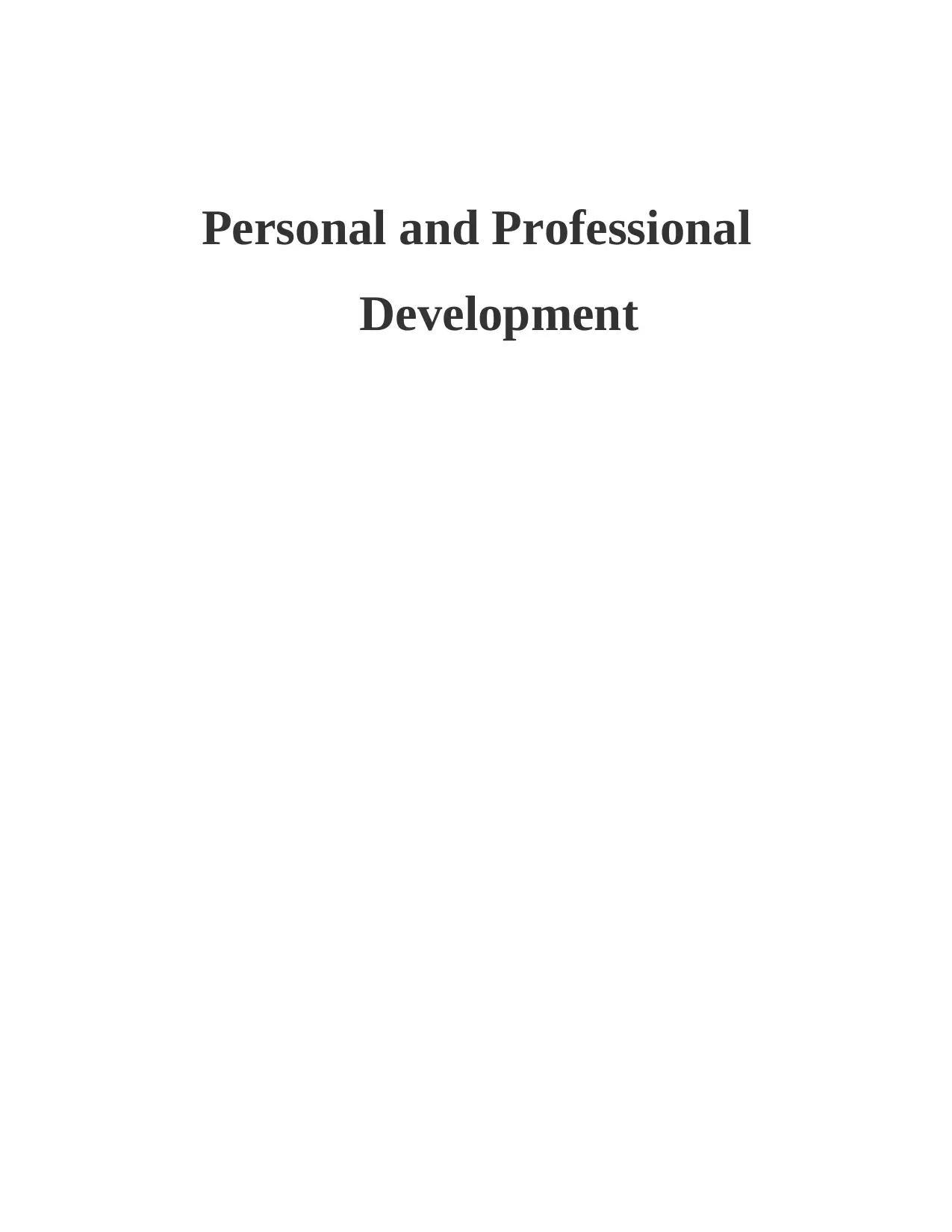
Personal and Professional
Development
Development
Secure Best Marks with AI Grader
Need help grading? Try our AI Grader for instant feedback on your assignments.
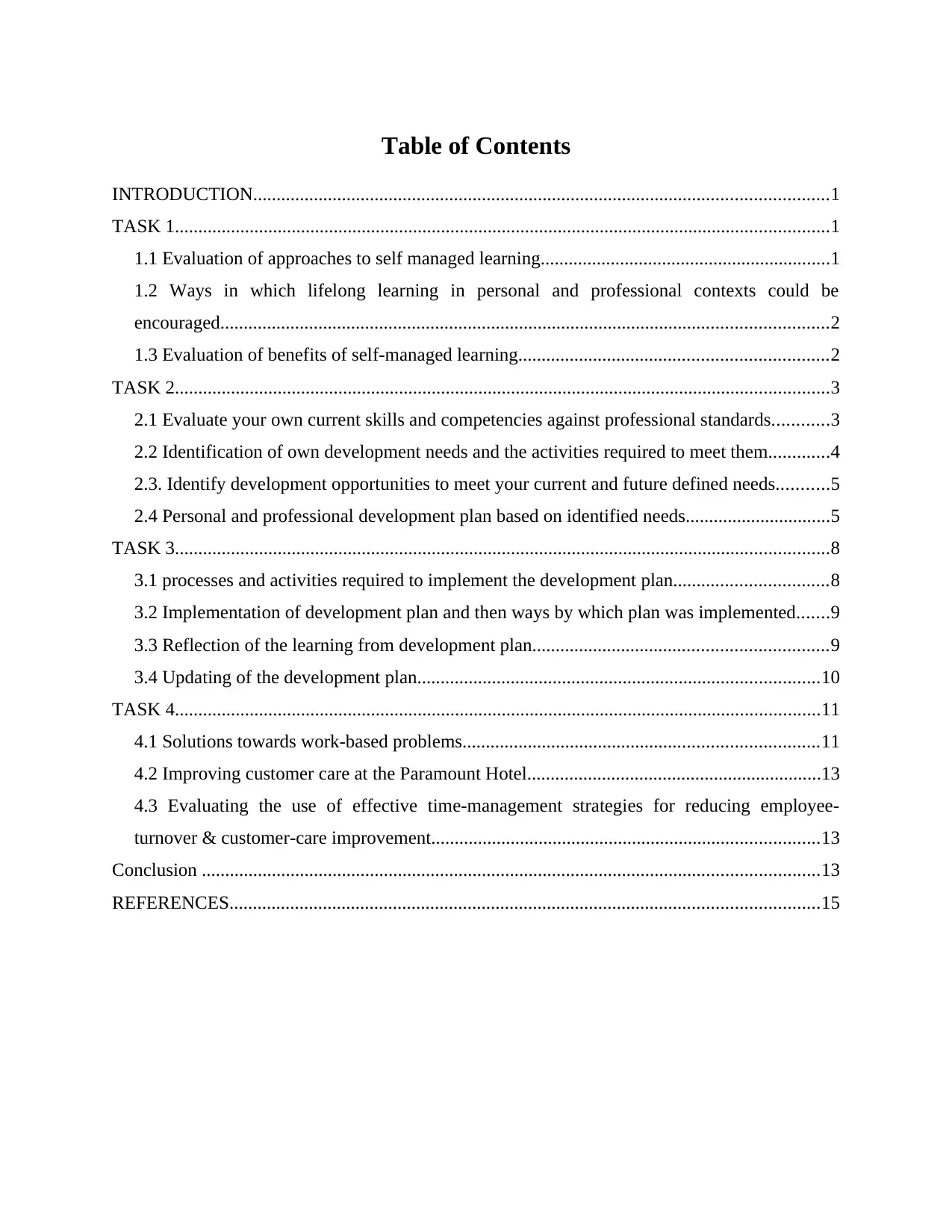
Table of Contents
INTRODUCTION...........................................................................................................................1
TASK 1............................................................................................................................................1
1.1 Evaluation of approaches to self managed learning..............................................................1
1.2 Ways in which lifelong learning in personal and professional contexts could be
encouraged..................................................................................................................................2
1.3 Evaluation of benefits of self-managed learning..................................................................2
TASK 2............................................................................................................................................3
2.1 Evaluate your own current skills and competencies against professional standards............3
2.2 Identification of own development needs and the activities required to meet them.............4
2.3. Identify development opportunities to meet your current and future defined needs...........5
2.4 Personal and professional development plan based on identified needs...............................5
TASK 3............................................................................................................................................8
3.1 processes and activities required to implement the development plan.................................8
3.2 Implementation of development plan and then ways by which plan was implemented.......9
3.3 Reflection of the learning from development plan...............................................................9
3.4 Updating of the development plan......................................................................................10
TASK 4..........................................................................................................................................11
4.1 Solutions towards work-based problems............................................................................11
4.2 Improving customer care at the Paramount Hotel...............................................................13
4.3 Evaluating the use of effective time-management strategies for reducing employee-
turnover & customer-care improvement...................................................................................13
Conclusion ....................................................................................................................................13
REFERENCES..............................................................................................................................15
INTRODUCTION...........................................................................................................................1
TASK 1............................................................................................................................................1
1.1 Evaluation of approaches to self managed learning..............................................................1
1.2 Ways in which lifelong learning in personal and professional contexts could be
encouraged..................................................................................................................................2
1.3 Evaluation of benefits of self-managed learning..................................................................2
TASK 2............................................................................................................................................3
2.1 Evaluate your own current skills and competencies against professional standards............3
2.2 Identification of own development needs and the activities required to meet them.............4
2.3. Identify development opportunities to meet your current and future defined needs...........5
2.4 Personal and professional development plan based on identified needs...............................5
TASK 3............................................................................................................................................8
3.1 processes and activities required to implement the development plan.................................8
3.2 Implementation of development plan and then ways by which plan was implemented.......9
3.3 Reflection of the learning from development plan...............................................................9
3.4 Updating of the development plan......................................................................................10
TASK 4..........................................................................................................................................11
4.1 Solutions towards work-based problems............................................................................11
4.2 Improving customer care at the Paramount Hotel...............................................................13
4.3 Evaluating the use of effective time-management strategies for reducing employee-
turnover & customer-care improvement...................................................................................13
Conclusion ....................................................................................................................................13
REFERENCES..............................................................................................................................15
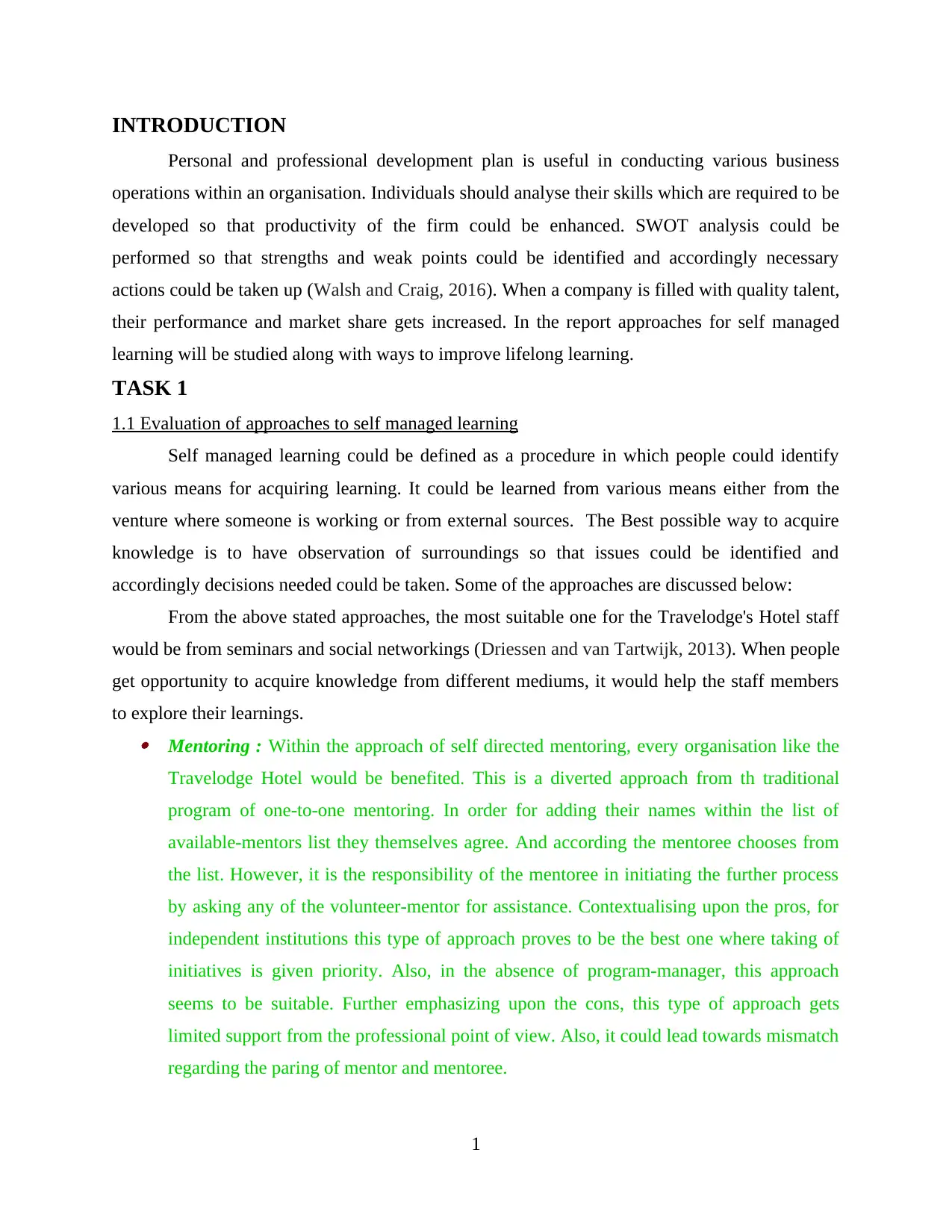
INTRODUCTION
Personal and professional development plan is useful in conducting various business
operations within an organisation. Individuals should analyse their skills which are required to be
developed so that productivity of the firm could be enhanced. SWOT analysis could be
performed so that strengths and weak points could be identified and accordingly necessary
actions could be taken up (Walsh and Craig, 2016). When a company is filled with quality talent,
their performance and market share gets increased. In the report approaches for self managed
learning will be studied along with ways to improve lifelong learning.
TASK 1
1.1 Evaluation of approaches to self managed learning
Self managed learning could be defined as a procedure in which people could identify
various means for acquiring learning. It could be learned from various means either from the
venture where someone is working or from external sources. The Best possible way to acquire
knowledge is to have observation of surroundings so that issues could be identified and
accordingly decisions needed could be taken. Some of the approaches are discussed below:
From the above stated approaches, the most suitable one for the Travelodge's Hotel staff
would be from seminars and social networkings (Driessen and van Tartwijk, 2013). When people
get opportunity to acquire knowledge from different mediums, it would help the staff members
to explore their learnings. Mentoring : Within the approach of self directed mentoring, every organisation like the
Travelodge Hotel would be benefited. This is a diverted approach from th traditional
program of one-to-one mentoring. In order for adding their names within the list of
available-mentors list they themselves agree. And according the mentoree chooses from
the list. However, it is the responsibility of the mentoree in initiating the further process
by asking any of the volunteer-mentor for assistance. Contextualising upon the pros, for
independent institutions this type of approach proves to be the best one where taking of
initiatives is given priority. Also, in the absence of program-manager, this approach
seems to be suitable. Further emphasizing upon the cons, this type of approach gets
limited support from the professional point of view. Also, it could lead towards mismatch
regarding the paring of mentor and mentoree.
1
Personal and professional development plan is useful in conducting various business
operations within an organisation. Individuals should analyse their skills which are required to be
developed so that productivity of the firm could be enhanced. SWOT analysis could be
performed so that strengths and weak points could be identified and accordingly necessary
actions could be taken up (Walsh and Craig, 2016). When a company is filled with quality talent,
their performance and market share gets increased. In the report approaches for self managed
learning will be studied along with ways to improve lifelong learning.
TASK 1
1.1 Evaluation of approaches to self managed learning
Self managed learning could be defined as a procedure in which people could identify
various means for acquiring learning. It could be learned from various means either from the
venture where someone is working or from external sources. The Best possible way to acquire
knowledge is to have observation of surroundings so that issues could be identified and
accordingly decisions needed could be taken. Some of the approaches are discussed below:
From the above stated approaches, the most suitable one for the Travelodge's Hotel staff
would be from seminars and social networkings (Driessen and van Tartwijk, 2013). When people
get opportunity to acquire knowledge from different mediums, it would help the staff members
to explore their learnings. Mentoring : Within the approach of self directed mentoring, every organisation like the
Travelodge Hotel would be benefited. This is a diverted approach from th traditional
program of one-to-one mentoring. In order for adding their names within the list of
available-mentors list they themselves agree. And according the mentoree chooses from
the list. However, it is the responsibility of the mentoree in initiating the further process
by asking any of the volunteer-mentor for assistance. Contextualising upon the pros, for
independent institutions this type of approach proves to be the best one where taking of
initiatives is given priority. Also, in the absence of program-manager, this approach
seems to be suitable. Further emphasizing upon the cons, this type of approach gets
limited support from the professional point of view. Also, it could lead towards mismatch
regarding the paring of mentor and mentoree.
1
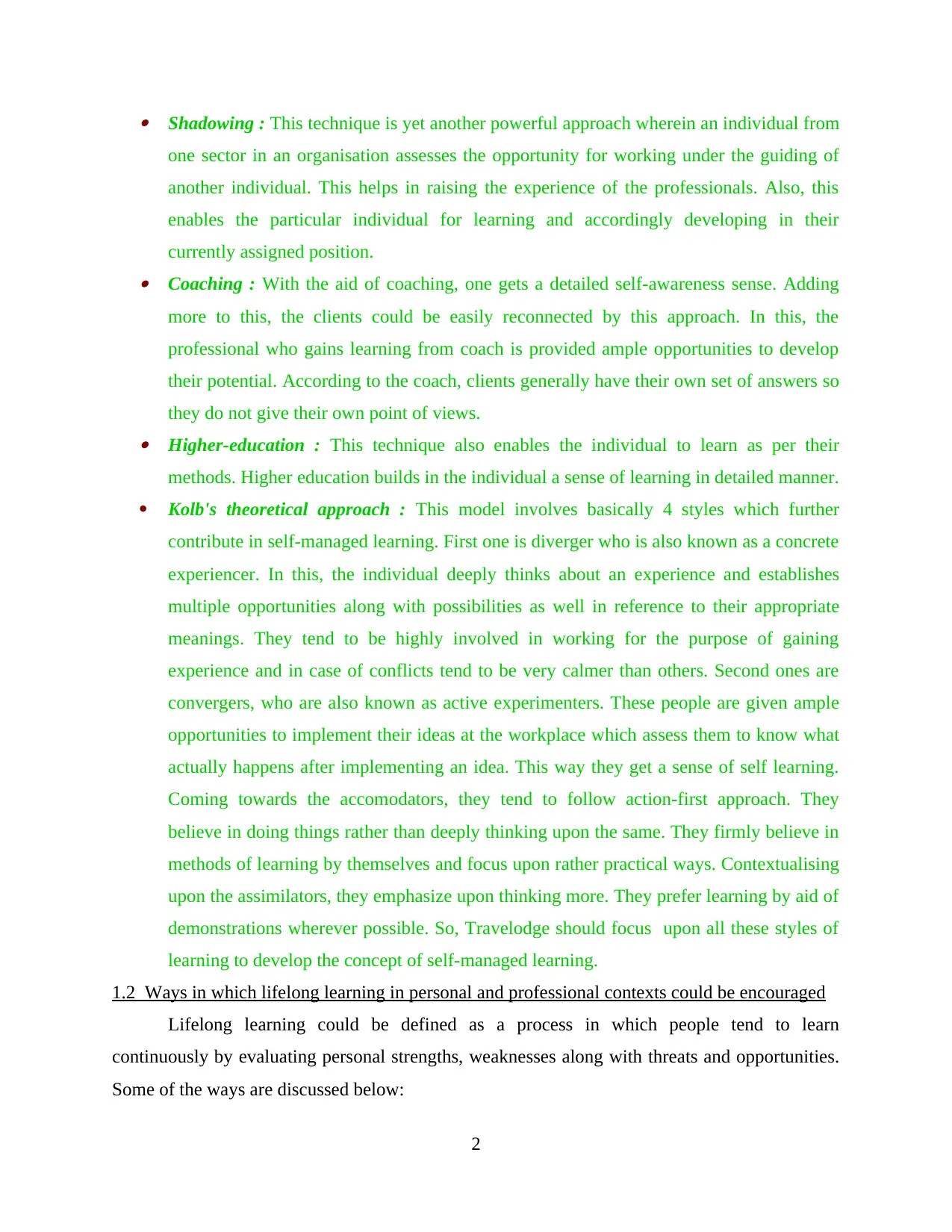
Shadowing : This technique is yet another powerful approach wherein an individual from
one sector in an organisation assesses the opportunity for working under the guiding of
another individual. This helps in raising the experience of the professionals. Also, this
enables the particular individual for learning and accordingly developing in their
currently assigned position. Coaching : With the aid of coaching, one gets a detailed self-awareness sense. Adding
more to this, the clients could be easily reconnected by this approach. In this, the
professional who gains learning from coach is provided ample opportunities to develop
their potential. According to the coach, clients generally have their own set of answers so
they do not give their own point of views. Higher-education : This technique also enables the individual to learn as per their
methods. Higher education builds in the individual a sense of learning in detailed manner.
Kolb's theoretical approach : This model involves basically 4 styles which further
contribute in self-managed learning. First one is diverger who is also known as a concrete
experiencer. In this, the individual deeply thinks about an experience and establishes
multiple opportunities along with possibilities as well in reference to their appropriate
meanings. They tend to be highly involved in working for the purpose of gaining
experience and in case of conflicts tend to be very calmer than others. Second ones are
convergers, who are also known as active experimenters. These people are given ample
opportunities to implement their ideas at the workplace which assess them to know what
actually happens after implementing an idea. This way they get a sense of self learning.
Coming towards the accomodators, they tend to follow action-first approach. They
believe in doing things rather than deeply thinking upon the same. They firmly believe in
methods of learning by themselves and focus upon rather practical ways. Contextualising
upon the assimilators, they emphasize upon thinking more. They prefer learning by aid of
demonstrations wherever possible. So, Travelodge should focus upon all these styles of
learning to develop the concept of self-managed learning.
1.2 Ways in which lifelong learning in personal and professional contexts could be encouraged
Lifelong learning could be defined as a process in which people tend to learn
continuously by evaluating personal strengths, weaknesses along with threats and opportunities.
Some of the ways are discussed below:
2
one sector in an organisation assesses the opportunity for working under the guiding of
another individual. This helps in raising the experience of the professionals. Also, this
enables the particular individual for learning and accordingly developing in their
currently assigned position. Coaching : With the aid of coaching, one gets a detailed self-awareness sense. Adding
more to this, the clients could be easily reconnected by this approach. In this, the
professional who gains learning from coach is provided ample opportunities to develop
their potential. According to the coach, clients generally have their own set of answers so
they do not give their own point of views. Higher-education : This technique also enables the individual to learn as per their
methods. Higher education builds in the individual a sense of learning in detailed manner.
Kolb's theoretical approach : This model involves basically 4 styles which further
contribute in self-managed learning. First one is diverger who is also known as a concrete
experiencer. In this, the individual deeply thinks about an experience and establishes
multiple opportunities along with possibilities as well in reference to their appropriate
meanings. They tend to be highly involved in working for the purpose of gaining
experience and in case of conflicts tend to be very calmer than others. Second ones are
convergers, who are also known as active experimenters. These people are given ample
opportunities to implement their ideas at the workplace which assess them to know what
actually happens after implementing an idea. This way they get a sense of self learning.
Coming towards the accomodators, they tend to follow action-first approach. They
believe in doing things rather than deeply thinking upon the same. They firmly believe in
methods of learning by themselves and focus upon rather practical ways. Contextualising
upon the assimilators, they emphasize upon thinking more. They prefer learning by aid of
demonstrations wherever possible. So, Travelodge should focus upon all these styles of
learning to develop the concept of self-managed learning.
1.2 Ways in which lifelong learning in personal and professional contexts could be encouraged
Lifelong learning could be defined as a process in which people tend to learn
continuously by evaluating personal strengths, weaknesses along with threats and opportunities.
Some of the ways are discussed below:
2
Secure Best Marks with AI Grader
Need help grading? Try our AI Grader for instant feedback on your assignments.
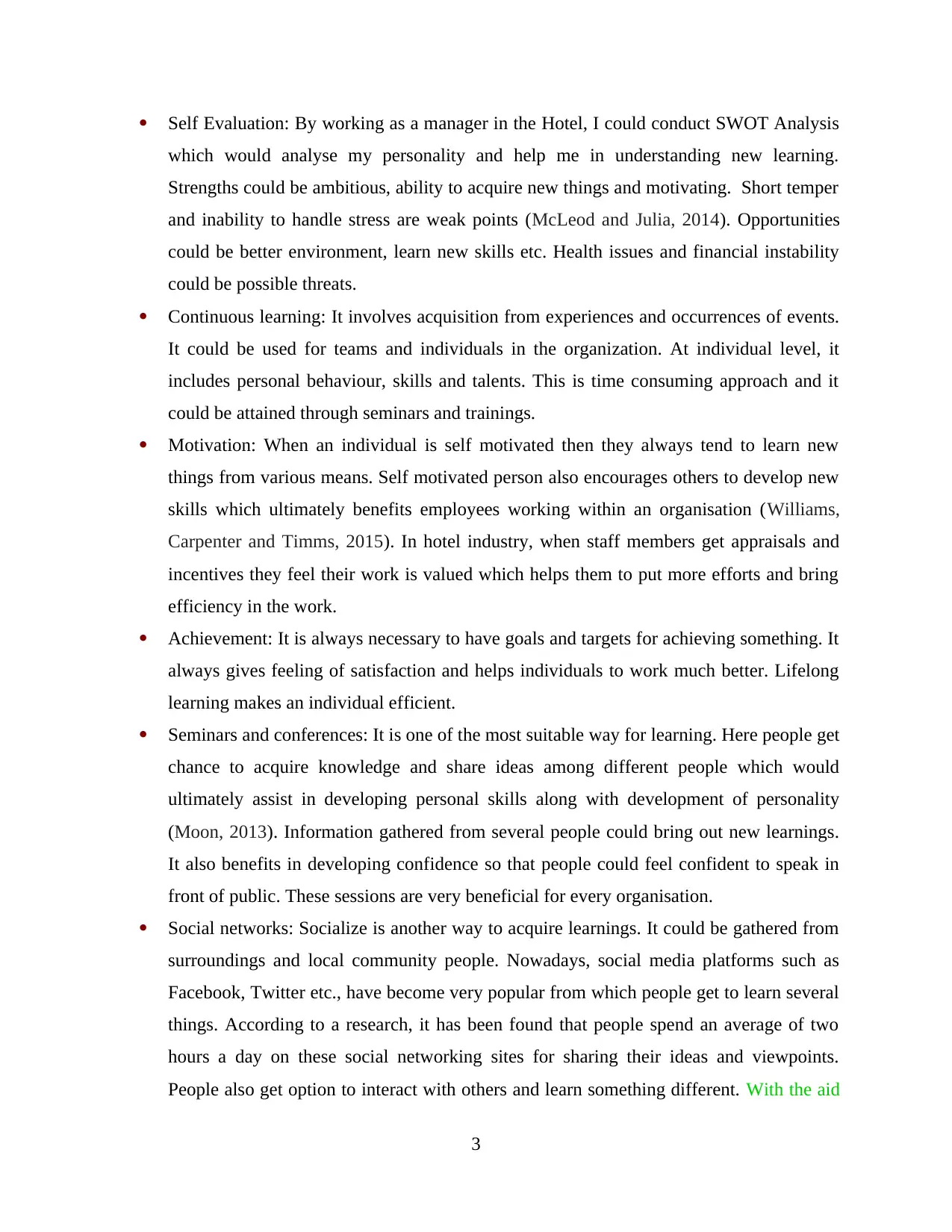
Self Evaluation: By working as a manager in the Hotel, I could conduct SWOT Analysis
which would analyse my personality and help me in understanding new learning.
Strengths could be ambitious, ability to acquire new things and motivating. Short temper
and inability to handle stress are weak points (McLeod and Julia, 2014). Opportunities
could be better environment, learn new skills etc. Health issues and financial instability
could be possible threats.
Continuous learning: It involves acquisition from experiences and occurrences of events.
It could be used for teams and individuals in the organization. At individual level, it
includes personal behaviour, skills and talents. This is time consuming approach and it
could be attained through seminars and trainings.
Motivation: When an individual is self motivated then they always tend to learn new
things from various means. Self motivated person also encourages others to develop new
skills which ultimately benefits employees working within an organisation (Williams,
Carpenter and Timms, 2015). In hotel industry, when staff members get appraisals and
incentives they feel their work is valued which helps them to put more efforts and bring
efficiency in the work.
Achievement: It is always necessary to have goals and targets for achieving something. It
always gives feeling of satisfaction and helps individuals to work much better. Lifelong
learning makes an individual efficient.
Seminars and conferences: It is one of the most suitable way for learning. Here people get
chance to acquire knowledge and share ideas among different people which would
ultimately assist in developing personal skills along with development of personality
(Moon, 2013). Information gathered from several people could bring out new learnings.
It also benefits in developing confidence so that people could feel confident to speak in
front of public. These sessions are very beneficial for every organisation.
Social networks: Socialize is another way to acquire learnings. It could be gathered from
surroundings and local community people. Nowadays, social media platforms such as
Facebook, Twitter etc., have become very popular from which people get to learn several
things. According to a research, it has been found that people spend an average of two
hours a day on these social networking sites for sharing their ideas and viewpoints.
People also get option to interact with others and learn something different. With the aid
3
which would analyse my personality and help me in understanding new learning.
Strengths could be ambitious, ability to acquire new things and motivating. Short temper
and inability to handle stress are weak points (McLeod and Julia, 2014). Opportunities
could be better environment, learn new skills etc. Health issues and financial instability
could be possible threats.
Continuous learning: It involves acquisition from experiences and occurrences of events.
It could be used for teams and individuals in the organization. At individual level, it
includes personal behaviour, skills and talents. This is time consuming approach and it
could be attained through seminars and trainings.
Motivation: When an individual is self motivated then they always tend to learn new
things from various means. Self motivated person also encourages others to develop new
skills which ultimately benefits employees working within an organisation (Williams,
Carpenter and Timms, 2015). In hotel industry, when staff members get appraisals and
incentives they feel their work is valued which helps them to put more efforts and bring
efficiency in the work.
Achievement: It is always necessary to have goals and targets for achieving something. It
always gives feeling of satisfaction and helps individuals to work much better. Lifelong
learning makes an individual efficient.
Seminars and conferences: It is one of the most suitable way for learning. Here people get
chance to acquire knowledge and share ideas among different people which would
ultimately assist in developing personal skills along with development of personality
(Moon, 2013). Information gathered from several people could bring out new learnings.
It also benefits in developing confidence so that people could feel confident to speak in
front of public. These sessions are very beneficial for every organisation.
Social networks: Socialize is another way to acquire learnings. It could be gathered from
surroundings and local community people. Nowadays, social media platforms such as
Facebook, Twitter etc., have become very popular from which people get to learn several
things. According to a research, it has been found that people spend an average of two
hours a day on these social networking sites for sharing their ideas and viewpoints.
People also get option to interact with others and learn something different. With the aid
3

of social networks, diversified viewpoints could be obtained from customers. These
obtained reviews could be used to implement the new procedures necessary for
improvements inn Travelodge. Adding more to this, with the help of social-media
platforms, individuals could learn by themselves by interacting with other colleagues and
customers. There are ample of videos consistently uploaded regarding the work related
criteria. So, social media provides an effective platform to easily assess these videos and
gain knowledge from people spread across the world.
1.3 Evaluation of benefits of self-managed learning
While working as a Manager in Travelodge Hotel, I have analysed various benefits of
self managed learning that have positive impact on the organisation. It assists people to build
decision making capabilities from the experiences that made them capable to take steps as per
the demand of situation. Thus, self learning is an additive advantage for any venture as it
provides people to have more effective problem solving skills which is gathered from
surroundings from varied ways.
Self managed learning skills could be transferred to others as well so that peole could
also acquire learnings. Nowadays, in organisations it is preferred that they have flexibility in
workers so that they could be assigned with several other tasks opposite to their comfort zone.
Some benefits of this kind of learning are discussed below:
Teamwork capabilities: As we know, learning is acquired from various sources such as
seminars, conferences and group discussions which enables people to work as a single
unit. Teamwork ensures quality and productive outcomes that enhances performance and
efficiency of the work. It also makes individuals to discover and explore different areas
of the proposed subject.
Presentation skills: When people acquire knowledge from different sources such as
seminars, group work, discussions, conferences etc., it makes them build and enhance
interaction skills along with confidence (Korthagen, 2017). Communication skills: For every individual it very necessary to have good
communication skills along with writing capabilities in the organisation. Thus, self
managed learning makes an individual independent which improves interaction quality
which helps them to present their views in better way.
Positives of Self-managed learning :-
4
obtained reviews could be used to implement the new procedures necessary for
improvements inn Travelodge. Adding more to this, with the help of social-media
platforms, individuals could learn by themselves by interacting with other colleagues and
customers. There are ample of videos consistently uploaded regarding the work related
criteria. So, social media provides an effective platform to easily assess these videos and
gain knowledge from people spread across the world.
1.3 Evaluation of benefits of self-managed learning
While working as a Manager in Travelodge Hotel, I have analysed various benefits of
self managed learning that have positive impact on the organisation. It assists people to build
decision making capabilities from the experiences that made them capable to take steps as per
the demand of situation. Thus, self learning is an additive advantage for any venture as it
provides people to have more effective problem solving skills which is gathered from
surroundings from varied ways.
Self managed learning skills could be transferred to others as well so that peole could
also acquire learnings. Nowadays, in organisations it is preferred that they have flexibility in
workers so that they could be assigned with several other tasks opposite to their comfort zone.
Some benefits of this kind of learning are discussed below:
Teamwork capabilities: As we know, learning is acquired from various sources such as
seminars, conferences and group discussions which enables people to work as a single
unit. Teamwork ensures quality and productive outcomes that enhances performance and
efficiency of the work. It also makes individuals to discover and explore different areas
of the proposed subject.
Presentation skills: When people acquire knowledge from different sources such as
seminars, group work, discussions, conferences etc., it makes them build and enhance
interaction skills along with confidence (Korthagen, 2017). Communication skills: For every individual it very necessary to have good
communication skills along with writing capabilities in the organisation. Thus, self
managed learning makes an individual independent which improves interaction quality
which helps them to present their views in better way.
Positives of Self-managed learning :-
4
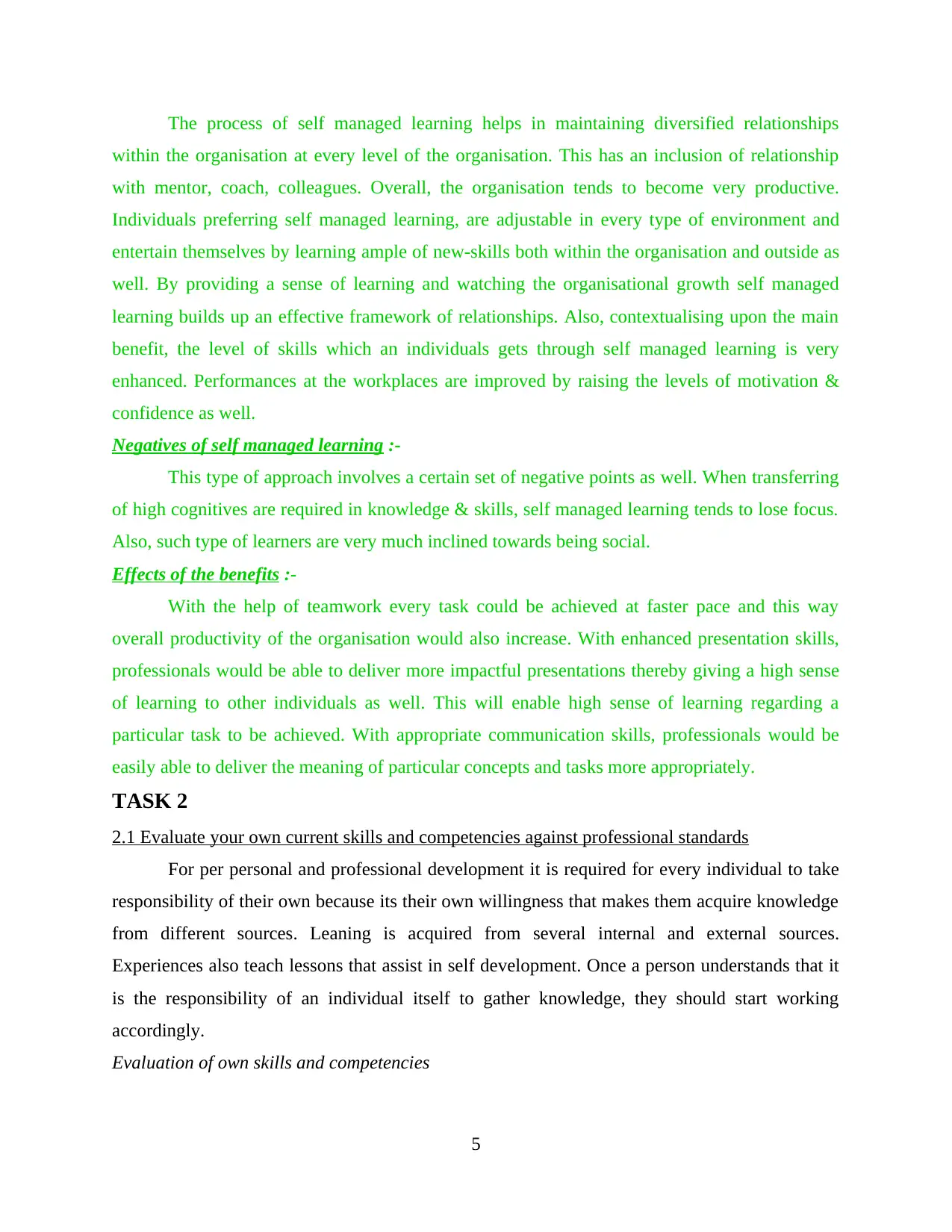
The process of self managed learning helps in maintaining diversified relationships
within the organisation at every level of the organisation. This has an inclusion of relationship
with mentor, coach, colleagues. Overall, the organisation tends to become very productive.
Individuals preferring self managed learning, are adjustable in every type of environment and
entertain themselves by learning ample of new-skills both within the organisation and outside as
well. By providing a sense of learning and watching the organisational growth self managed
learning builds up an effective framework of relationships. Also, contextualising upon the main
benefit, the level of skills which an individuals gets through self managed learning is very
enhanced. Performances at the workplaces are improved by raising the levels of motivation &
confidence as well.
Negatives of self managed learning :-
This type of approach involves a certain set of negative points as well. When transferring
of high cognitives are required in knowledge & skills, self managed learning tends to lose focus.
Also, such type of learners are very much inclined towards being social.
Effects of the benefits :-
With the help of teamwork every task could be achieved at faster pace and this way
overall productivity of the organisation would also increase. With enhanced presentation skills,
professionals would be able to deliver more impactful presentations thereby giving a high sense
of learning to other individuals as well. This will enable high sense of learning regarding a
particular task to be achieved. With appropriate communication skills, professionals would be
easily able to deliver the meaning of particular concepts and tasks more appropriately.
TASK 2
2.1 Evaluate your own current skills and competencies against professional standards
For per personal and professional development it is required for every individual to take
responsibility of their own because its their own willingness that makes them acquire knowledge
from different sources. Leaning is acquired from several internal and external sources.
Experiences also teach lessons that assist in self development. Once a person understands that it
is the responsibility of an individual itself to gather knowledge, they should start working
accordingly.
Evaluation of own skills and competencies
5
within the organisation at every level of the organisation. This has an inclusion of relationship
with mentor, coach, colleagues. Overall, the organisation tends to become very productive.
Individuals preferring self managed learning, are adjustable in every type of environment and
entertain themselves by learning ample of new-skills both within the organisation and outside as
well. By providing a sense of learning and watching the organisational growth self managed
learning builds up an effective framework of relationships. Also, contextualising upon the main
benefit, the level of skills which an individuals gets through self managed learning is very
enhanced. Performances at the workplaces are improved by raising the levels of motivation &
confidence as well.
Negatives of self managed learning :-
This type of approach involves a certain set of negative points as well. When transferring
of high cognitives are required in knowledge & skills, self managed learning tends to lose focus.
Also, such type of learners are very much inclined towards being social.
Effects of the benefits :-
With the help of teamwork every task could be achieved at faster pace and this way
overall productivity of the organisation would also increase. With enhanced presentation skills,
professionals would be able to deliver more impactful presentations thereby giving a high sense
of learning to other individuals as well. This will enable high sense of learning regarding a
particular task to be achieved. With appropriate communication skills, professionals would be
easily able to deliver the meaning of particular concepts and tasks more appropriately.
TASK 2
2.1 Evaluate your own current skills and competencies against professional standards
For per personal and professional development it is required for every individual to take
responsibility of their own because its their own willingness that makes them acquire knowledge
from different sources. Leaning is acquired from several internal and external sources.
Experiences also teach lessons that assist in self development. Once a person understands that it
is the responsibility of an individual itself to gather knowledge, they should start working
accordingly.
Evaluation of own skills and competencies
5
Paraphrase This Document
Need a fresh take? Get an instant paraphrase of this document with our AI Paraphraser
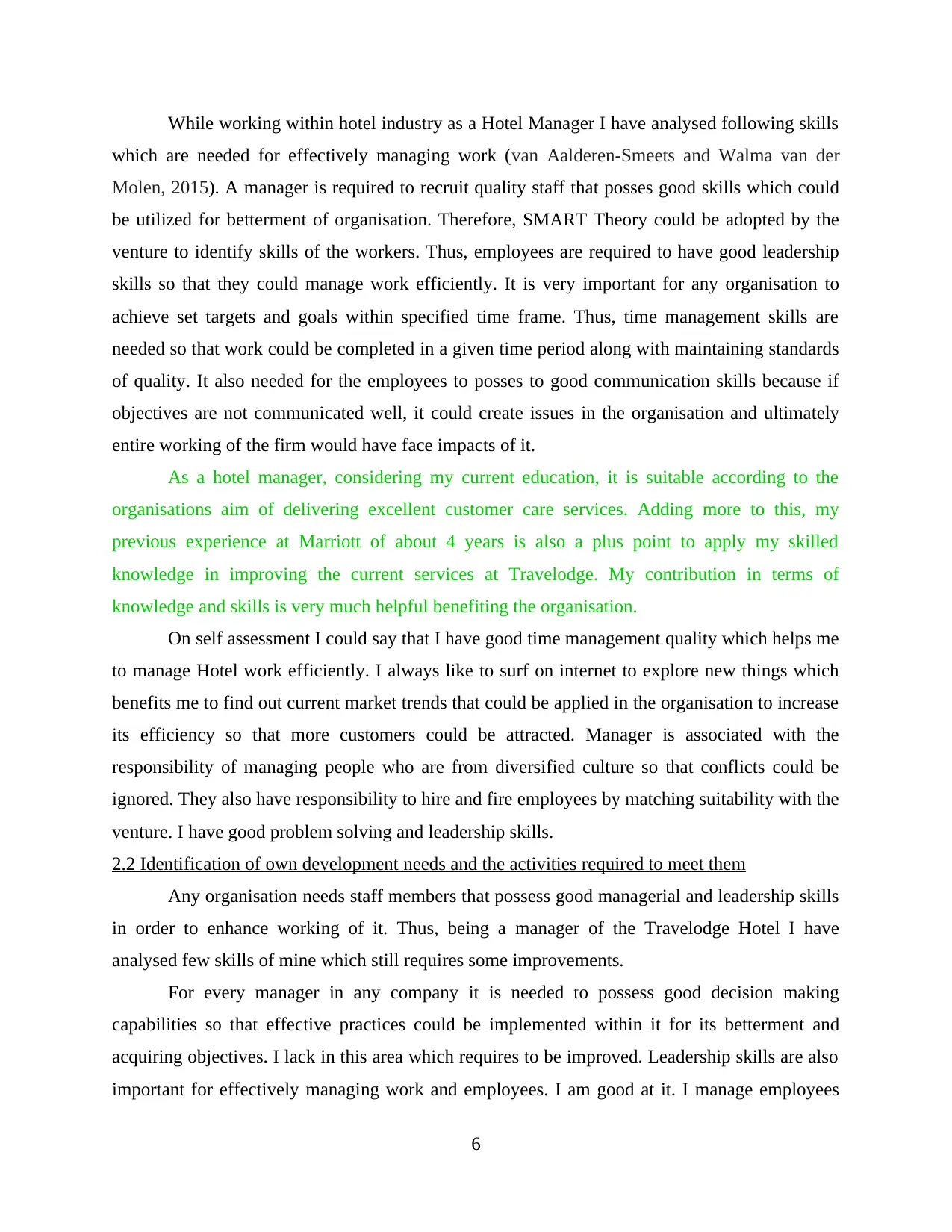
While working within hotel industry as a Hotel Manager I have analysed following skills
which are needed for effectively managing work (van Aalderen‐Smeets and Walma van der
Molen, 2015). A manager is required to recruit quality staff that posses good skills which could
be utilized for betterment of organisation. Therefore, SMART Theory could be adopted by the
venture to identify skills of the workers. Thus, employees are required to have good leadership
skills so that they could manage work efficiently. It is very important for any organisation to
achieve set targets and goals within specified time frame. Thus, time management skills are
needed so that work could be completed in a given time period along with maintaining standards
of quality. It also needed for the employees to posses to good communication skills because if
objectives are not communicated well, it could create issues in the organisation and ultimately
entire working of the firm would have face impacts of it.
As a hotel manager, considering my current education, it is suitable according to the
organisations aim of delivering excellent customer care services. Adding more to this, my
previous experience at Marriott of about 4 years is also a plus point to apply my skilled
knowledge in improving the current services at Travelodge. My contribution in terms of
knowledge and skills is very much helpful benefiting the organisation.
On self assessment I could say that I have good time management quality which helps me
to manage Hotel work efficiently. I always like to surf on internet to explore new things which
benefits me to find out current market trends that could be applied in the organisation to increase
its efficiency so that more customers could be attracted. Manager is associated with the
responsibility of managing people who are from diversified culture so that conflicts could be
ignored. They also have responsibility to hire and fire employees by matching suitability with the
venture. I have good problem solving and leadership skills.
2.2 Identification of own development needs and the activities required to meet them
Any organisation needs staff members that possess good managerial and leadership skills
in order to enhance working of it. Thus, being a manager of the Travelodge Hotel I have
analysed few skills of mine which still requires some improvements.
For every manager in any company it is needed to possess good decision making
capabilities so that effective practices could be implemented within it for its betterment and
acquiring objectives. I lack in this area which requires to be improved. Leadership skills are also
important for effectively managing work and employees. I am good at it. I manage employees
6
which are needed for effectively managing work (van Aalderen‐Smeets and Walma van der
Molen, 2015). A manager is required to recruit quality staff that posses good skills which could
be utilized for betterment of organisation. Therefore, SMART Theory could be adopted by the
venture to identify skills of the workers. Thus, employees are required to have good leadership
skills so that they could manage work efficiently. It is very important for any organisation to
achieve set targets and goals within specified time frame. Thus, time management skills are
needed so that work could be completed in a given time period along with maintaining standards
of quality. It also needed for the employees to posses to good communication skills because if
objectives are not communicated well, it could create issues in the organisation and ultimately
entire working of the firm would have face impacts of it.
As a hotel manager, considering my current education, it is suitable according to the
organisations aim of delivering excellent customer care services. Adding more to this, my
previous experience at Marriott of about 4 years is also a plus point to apply my skilled
knowledge in improving the current services at Travelodge. My contribution in terms of
knowledge and skills is very much helpful benefiting the organisation.
On self assessment I could say that I have good time management quality which helps me
to manage Hotel work efficiently. I always like to surf on internet to explore new things which
benefits me to find out current market trends that could be applied in the organisation to increase
its efficiency so that more customers could be attracted. Manager is associated with the
responsibility of managing people who are from diversified culture so that conflicts could be
ignored. They also have responsibility to hire and fire employees by matching suitability with the
venture. I have good problem solving and leadership skills.
2.2 Identification of own development needs and the activities required to meet them
Any organisation needs staff members that possess good managerial and leadership skills
in order to enhance working of it. Thus, being a manager of the Travelodge Hotel I have
analysed few skills of mine which still requires some improvements.
For every manager in any company it is needed to possess good decision making
capabilities so that effective practices could be implemented within it for its betterment and
acquiring objectives. I lack in this area which requires to be improved. Leadership skills are also
important for effectively managing work and employees. I am good at it. I manage employees
6
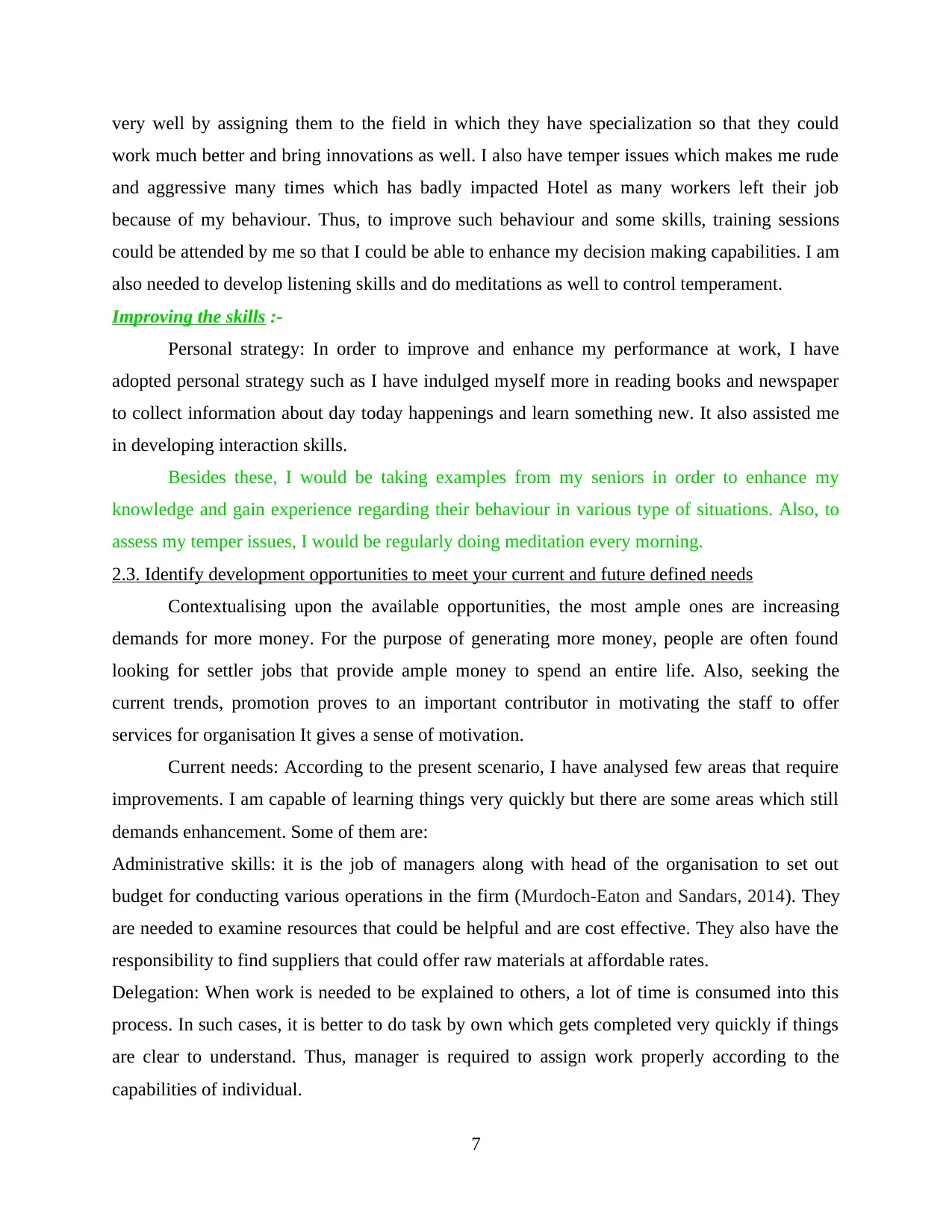
very well by assigning them to the field in which they have specialization so that they could
work much better and bring innovations as well. I also have temper issues which makes me rude
and aggressive many times which has badly impacted Hotel as many workers left their job
because of my behaviour. Thus, to improve such behaviour and some skills, training sessions
could be attended by me so that I could be able to enhance my decision making capabilities. I am
also needed to develop listening skills and do meditations as well to control temperament.
Improving the skills :-
Personal strategy: In order to improve and enhance my performance at work, I have
adopted personal strategy such as I have indulged myself more in reading books and newspaper
to collect information about day today happenings and learn something new. It also assisted me
in developing interaction skills.
Besides these, I would be taking examples from my seniors in order to enhance my
knowledge and gain experience regarding their behaviour in various type of situations. Also, to
assess my temper issues, I would be regularly doing meditation every morning.
2.3. Identify development opportunities to meet your current and future defined needs
Contextualising upon the available opportunities, the most ample ones are increasing
demands for more money. For the purpose of generating more money, people are often found
looking for settler jobs that provide ample money to spend an entire life. Also, seeking the
current trends, promotion proves to an important contributor in motivating the staff to offer
services for organisation It gives a sense of motivation.
Current needs: According to the present scenario, I have analysed few areas that require
improvements. I am capable of learning things very quickly but there are some areas which still
demands enhancement. Some of them are:
Administrative skills: it is the job of managers along with head of the organisation to set out
budget for conducting various operations in the firm (Murdoch-Eaton and Sandars, 2014). They
are needed to examine resources that could be helpful and are cost effective. They also have the
responsibility to find suppliers that could offer raw materials at affordable rates.
Delegation: When work is needed to be explained to others, a lot of time is consumed into this
process. In such cases, it is better to do task by own which gets completed very quickly if things
are clear to understand. Thus, manager is required to assign work properly according to the
capabilities of individual.
7
work much better and bring innovations as well. I also have temper issues which makes me rude
and aggressive many times which has badly impacted Hotel as many workers left their job
because of my behaviour. Thus, to improve such behaviour and some skills, training sessions
could be attended by me so that I could be able to enhance my decision making capabilities. I am
also needed to develop listening skills and do meditations as well to control temperament.
Improving the skills :-
Personal strategy: In order to improve and enhance my performance at work, I have
adopted personal strategy such as I have indulged myself more in reading books and newspaper
to collect information about day today happenings and learn something new. It also assisted me
in developing interaction skills.
Besides these, I would be taking examples from my seniors in order to enhance my
knowledge and gain experience regarding their behaviour in various type of situations. Also, to
assess my temper issues, I would be regularly doing meditation every morning.
2.3. Identify development opportunities to meet your current and future defined needs
Contextualising upon the available opportunities, the most ample ones are increasing
demands for more money. For the purpose of generating more money, people are often found
looking for settler jobs that provide ample money to spend an entire life. Also, seeking the
current trends, promotion proves to an important contributor in motivating the staff to offer
services for organisation It gives a sense of motivation.
Current needs: According to the present scenario, I have analysed few areas that require
improvements. I am capable of learning things very quickly but there are some areas which still
demands enhancement. Some of them are:
Administrative skills: it is the job of managers along with head of the organisation to set out
budget for conducting various operations in the firm (Murdoch-Eaton and Sandars, 2014). They
are needed to examine resources that could be helpful and are cost effective. They also have the
responsibility to find suppliers that could offer raw materials at affordable rates.
Delegation: When work is needed to be explained to others, a lot of time is consumed into this
process. In such cases, it is better to do task by own which gets completed very quickly if things
are clear to understand. Thus, manager is required to assign work properly according to the
capabilities of individual.
7
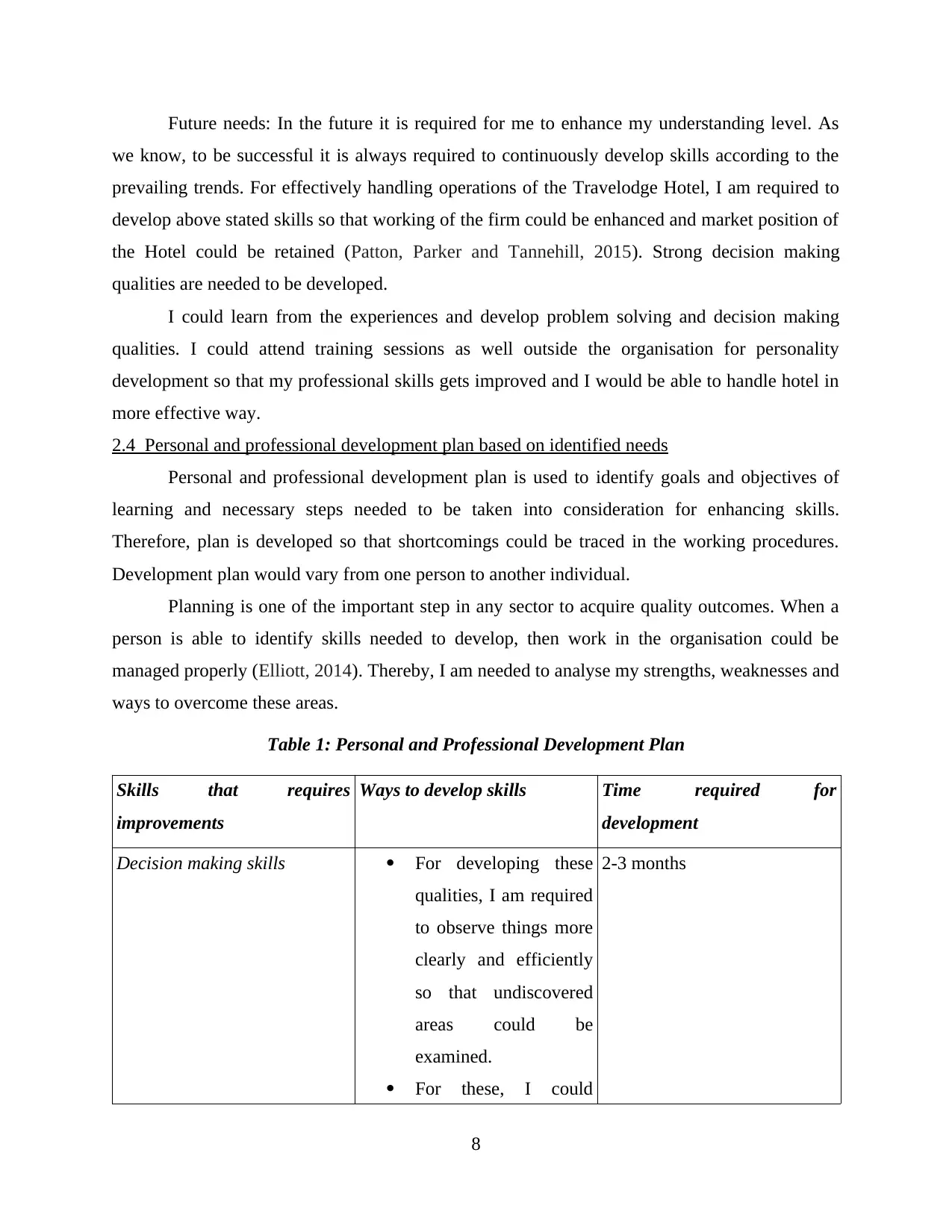
Future needs: In the future it is required for me to enhance my understanding level. As
we know, to be successful it is always required to continuously develop skills according to the
prevailing trends. For effectively handling operations of the Travelodge Hotel, I am required to
develop above stated skills so that working of the firm could be enhanced and market position of
the Hotel could be retained (Patton, Parker and Tannehill, 2015). Strong decision making
qualities are needed to be developed.
I could learn from the experiences and develop problem solving and decision making
qualities. I could attend training sessions as well outside the organisation for personality
development so that my professional skills gets improved and I would be able to handle hotel in
more effective way.
2.4 Personal and professional development plan based on identified needs
Personal and professional development plan is used to identify goals and objectives of
learning and necessary steps needed to be taken into consideration for enhancing skills.
Therefore, plan is developed so that shortcomings could be traced in the working procedures.
Development plan would vary from one person to another individual.
Planning is one of the important step in any sector to acquire quality outcomes. When a
person is able to identify skills needed to develop, then work in the organisation could be
managed properly (Elliott, 2014). Thereby, I am needed to analyse my strengths, weaknesses and
ways to overcome these areas.
Table 1: Personal and Professional Development Plan
Skills that requires
improvements
Ways to develop skills Time required for
development
Decision making skills For developing these
qualities, I am required
to observe things more
clearly and efficiently
so that undiscovered
areas could be
examined.
For these, I could
2-3 months
8
we know, to be successful it is always required to continuously develop skills according to the
prevailing trends. For effectively handling operations of the Travelodge Hotel, I am required to
develop above stated skills so that working of the firm could be enhanced and market position of
the Hotel could be retained (Patton, Parker and Tannehill, 2015). Strong decision making
qualities are needed to be developed.
I could learn from the experiences and develop problem solving and decision making
qualities. I could attend training sessions as well outside the organisation for personality
development so that my professional skills gets improved and I would be able to handle hotel in
more effective way.
2.4 Personal and professional development plan based on identified needs
Personal and professional development plan is used to identify goals and objectives of
learning and necessary steps needed to be taken into consideration for enhancing skills.
Therefore, plan is developed so that shortcomings could be traced in the working procedures.
Development plan would vary from one person to another individual.
Planning is one of the important step in any sector to acquire quality outcomes. When a
person is able to identify skills needed to develop, then work in the organisation could be
managed properly (Elliott, 2014). Thereby, I am needed to analyse my strengths, weaknesses and
ways to overcome these areas.
Table 1: Personal and Professional Development Plan
Skills that requires
improvements
Ways to develop skills Time required for
development
Decision making skills For developing these
qualities, I am required
to observe things more
clearly and efficiently
so that undiscovered
areas could be
examined.
For these, I could
2-3 months
8
Secure Best Marks with AI Grader
Need help grading? Try our AI Grader for instant feedback on your assignments.
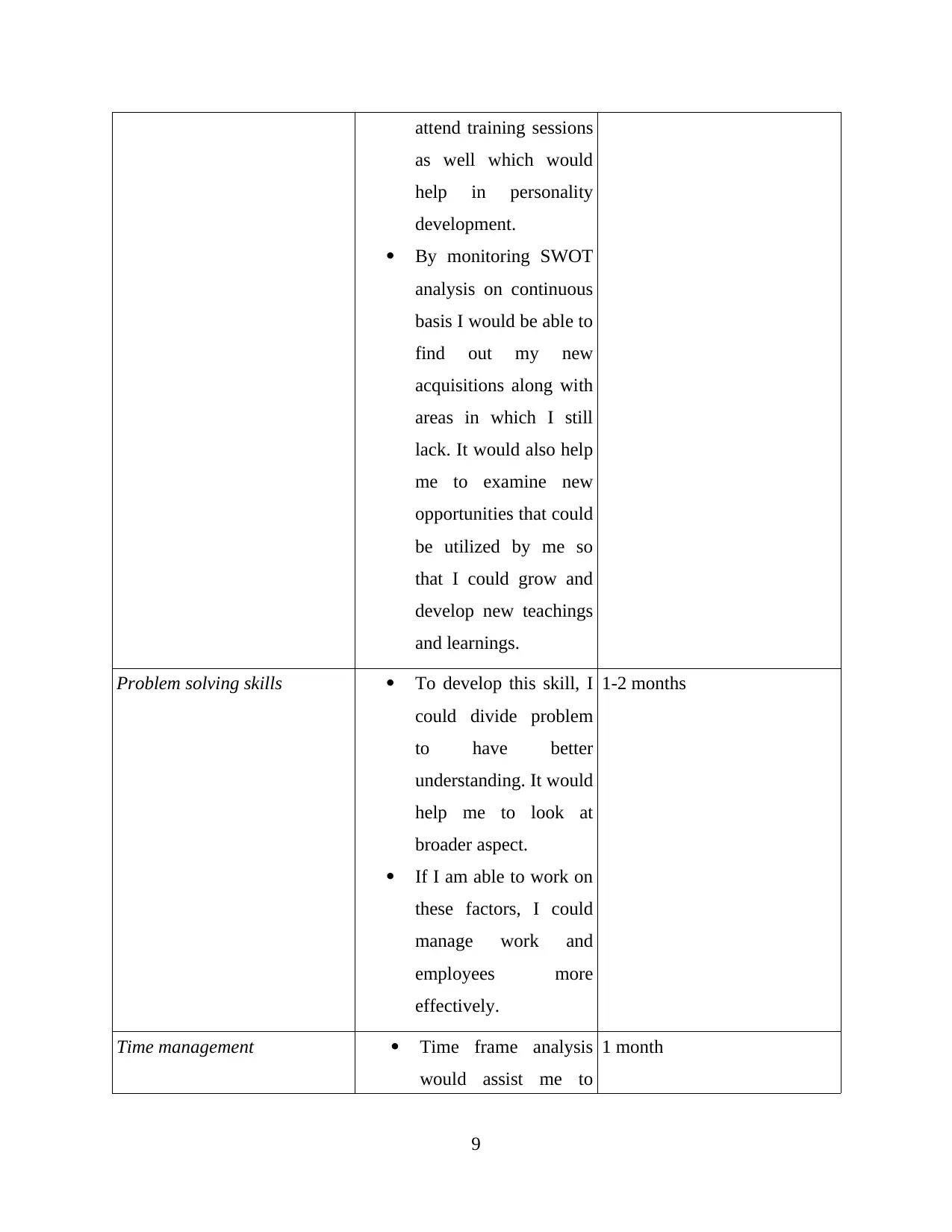
attend training sessions
as well which would
help in personality
development.
By monitoring SWOT
analysis on continuous
basis I would be able to
find out my new
acquisitions along with
areas in which I still
lack. It would also help
me to examine new
opportunities that could
be utilized by me so
that I could grow and
develop new teachings
and learnings.
Problem solving skills To develop this skill, I
could divide problem
to have better
understanding. It would
help me to look at
broader aspect.
If I am able to work on
these factors, I could
manage work and
employees more
effectively.
1-2 months
Time management Time frame analysis
would assist me to
1 month
9
as well which would
help in personality
development.
By monitoring SWOT
analysis on continuous
basis I would be able to
find out my new
acquisitions along with
areas in which I still
lack. It would also help
me to examine new
opportunities that could
be utilized by me so
that I could grow and
develop new teachings
and learnings.
Problem solving skills To develop this skill, I
could divide problem
to have better
understanding. It would
help me to look at
broader aspect.
If I am able to work on
these factors, I could
manage work and
employees more
effectively.
1-2 months
Time management Time frame analysis
would assist me to
1 month
9
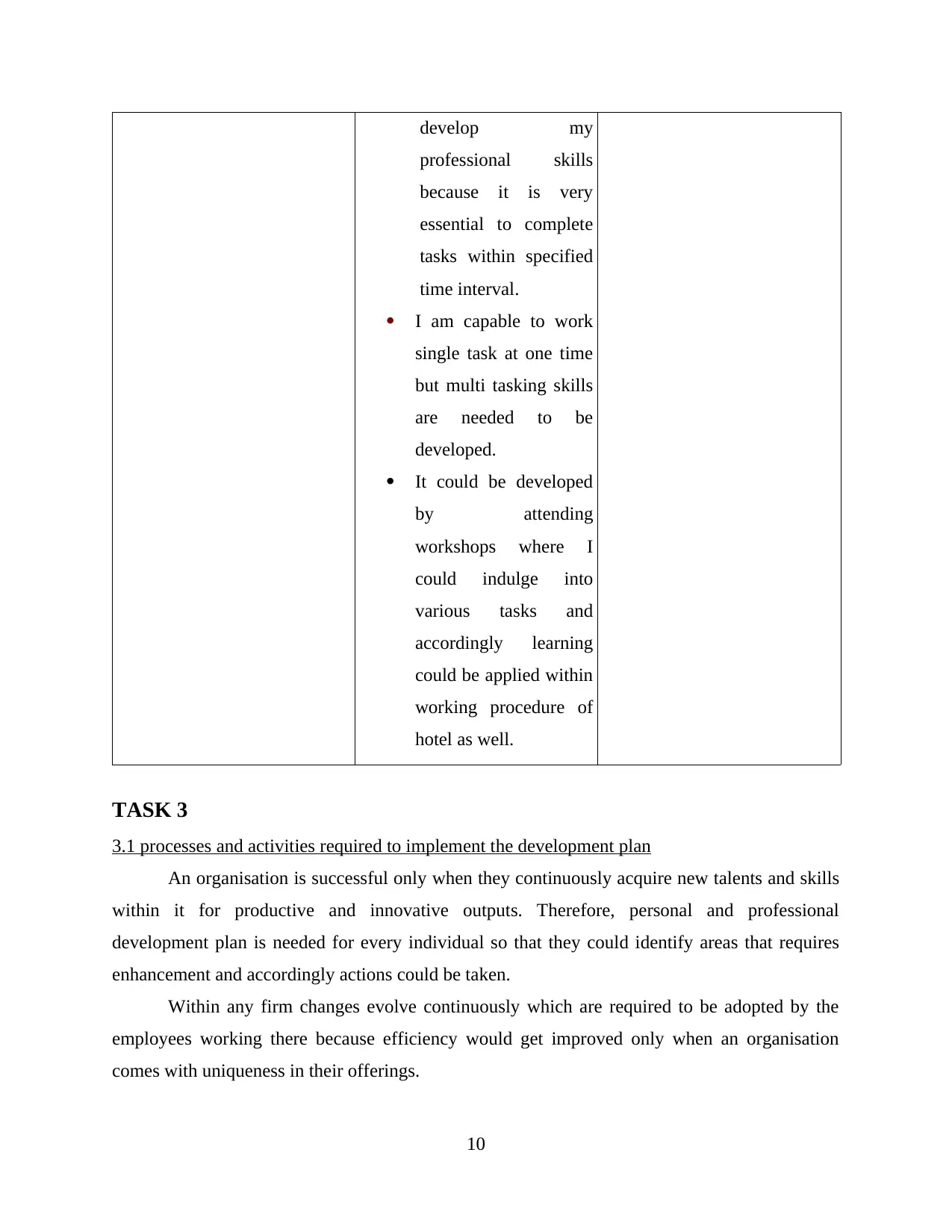
develop my
professional skills
because it is very
essential to complete
tasks within specified
time interval.
I am capable to work
single task at one time
but multi tasking skills
are needed to be
developed.
It could be developed
by attending
workshops where I
could indulge into
various tasks and
accordingly learning
could be applied within
working procedure of
hotel as well.
TASK 3
3.1 processes and activities required to implement the development plan
An organisation is successful only when they continuously acquire new talents and skills
within it for productive and innovative outputs. Therefore, personal and professional
development plan is needed for every individual so that they could identify areas that requires
enhancement and accordingly actions could be taken.
Within any firm changes evolve continuously which are required to be adopted by the
employees working there because efficiency would get improved only when an organisation
comes with uniqueness in their offerings.
10
professional skills
because it is very
essential to complete
tasks within specified
time interval.
I am capable to work
single task at one time
but multi tasking skills
are needed to be
developed.
It could be developed
by attending
workshops where I
could indulge into
various tasks and
accordingly learning
could be applied within
working procedure of
hotel as well.
TASK 3
3.1 processes and activities required to implement the development plan
An organisation is successful only when they continuously acquire new talents and skills
within it for productive and innovative outputs. Therefore, personal and professional
development plan is needed for every individual so that they could identify areas that requires
enhancement and accordingly actions could be taken.
Within any firm changes evolve continuously which are required to be adopted by the
employees working there because efficiency would get improved only when an organisation
comes with uniqueness in their offerings.
10
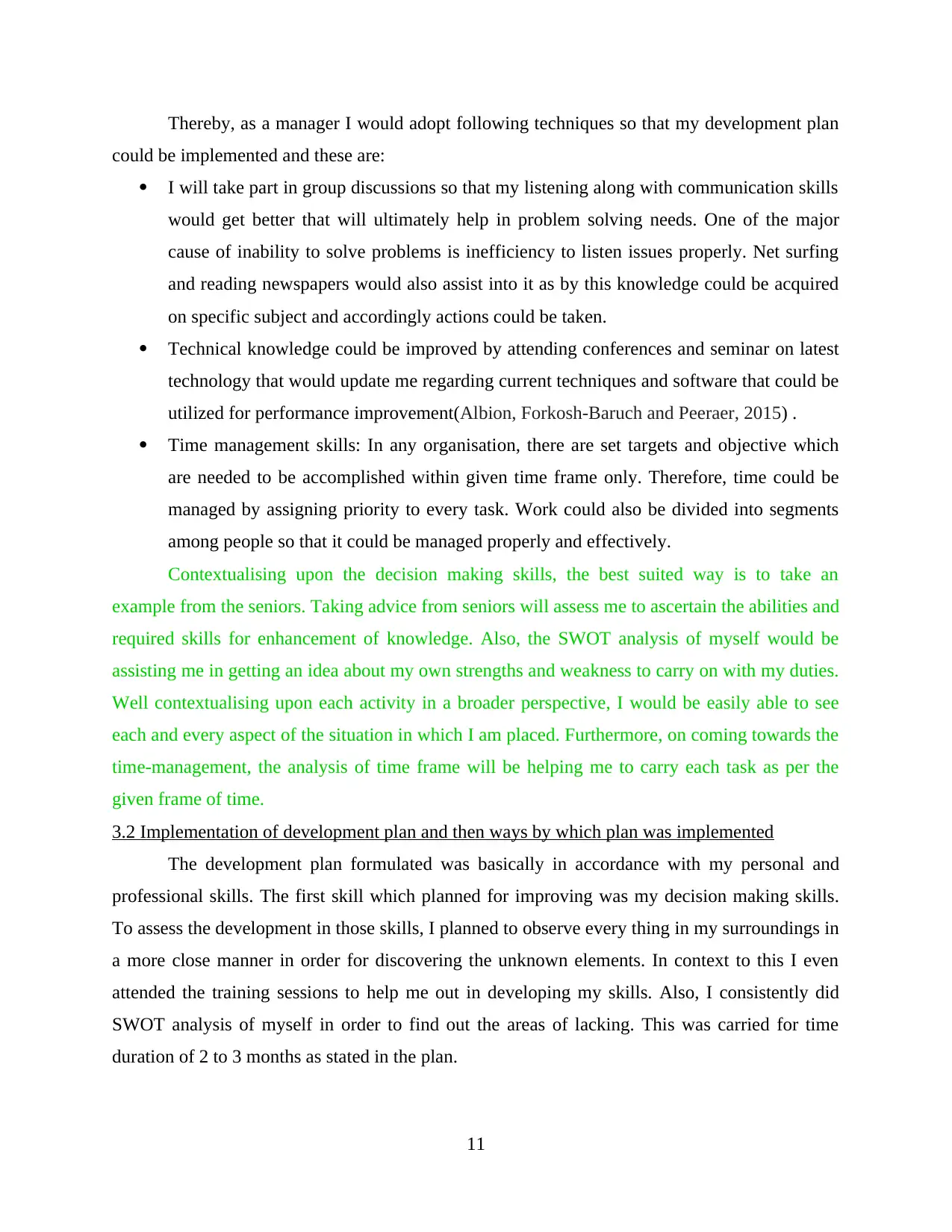
Thereby, as a manager I would adopt following techniques so that my development plan
could be implemented and these are:
I will take part in group discussions so that my listening along with communication skills
would get better that will ultimately help in problem solving needs. One of the major
cause of inability to solve problems is inefficiency to listen issues properly. Net surfing
and reading newspapers would also assist into it as by this knowledge could be acquired
on specific subject and accordingly actions could be taken.
Technical knowledge could be improved by attending conferences and seminar on latest
technology that would update me regarding current techniques and software that could be
utilized for performance improvement(Albion, Forkosh-Baruch and Peeraer, 2015) .
Time management skills: In any organisation, there are set targets and objective which
are needed to be accomplished within given time frame only. Therefore, time could be
managed by assigning priority to every task. Work could also be divided into segments
among people so that it could be managed properly and effectively.
Contextualising upon the decision making skills, the best suited way is to take an
example from the seniors. Taking advice from seniors will assess me to ascertain the abilities and
required skills for enhancement of knowledge. Also, the SWOT analysis of myself would be
assisting me in getting an idea about my own strengths and weakness to carry on with my duties.
Well contextualising upon each activity in a broader perspective, I would be easily able to see
each and every aspect of the situation in which I am placed. Furthermore, on coming towards the
time-management, the analysis of time frame will be helping me to carry each task as per the
given frame of time.
3.2 Implementation of development plan and then ways by which plan was implemented
The development plan formulated was basically in accordance with my personal and
professional skills. The first skill which planned for improving was my decision making skills.
To assess the development in those skills, I planned to observe every thing in my surroundings in
a more close manner in order for discovering the unknown elements. In context to this I even
attended the training sessions to help me out in developing my skills. Also, I consistently did
SWOT analysis of myself in order to find out the areas of lacking. This was carried for time
duration of 2 to 3 months as stated in the plan.
11
could be implemented and these are:
I will take part in group discussions so that my listening along with communication skills
would get better that will ultimately help in problem solving needs. One of the major
cause of inability to solve problems is inefficiency to listen issues properly. Net surfing
and reading newspapers would also assist into it as by this knowledge could be acquired
on specific subject and accordingly actions could be taken.
Technical knowledge could be improved by attending conferences and seminar on latest
technology that would update me regarding current techniques and software that could be
utilized for performance improvement(Albion, Forkosh-Baruch and Peeraer, 2015) .
Time management skills: In any organisation, there are set targets and objective which
are needed to be accomplished within given time frame only. Therefore, time could be
managed by assigning priority to every task. Work could also be divided into segments
among people so that it could be managed properly and effectively.
Contextualising upon the decision making skills, the best suited way is to take an
example from the seniors. Taking advice from seniors will assess me to ascertain the abilities and
required skills for enhancement of knowledge. Also, the SWOT analysis of myself would be
assisting me in getting an idea about my own strengths and weakness to carry on with my duties.
Well contextualising upon each activity in a broader perspective, I would be easily able to see
each and every aspect of the situation in which I am placed. Furthermore, on coming towards the
time-management, the analysis of time frame will be helping me to carry each task as per the
given frame of time.
3.2 Implementation of development plan and then ways by which plan was implemented
The development plan formulated was basically in accordance with my personal and
professional skills. The first skill which planned for improving was my decision making skills.
To assess the development in those skills, I planned to observe every thing in my surroundings in
a more close manner in order for discovering the unknown elements. In context to this I even
attended the training sessions to help me out in developing my skills. Also, I consistently did
SWOT analysis of myself in order to find out the areas of lacking. This was carried for time
duration of 2 to 3 months as stated in the plan.
11
Paraphrase This Document
Need a fresh take? Get an instant paraphrase of this document with our AI Paraphraser
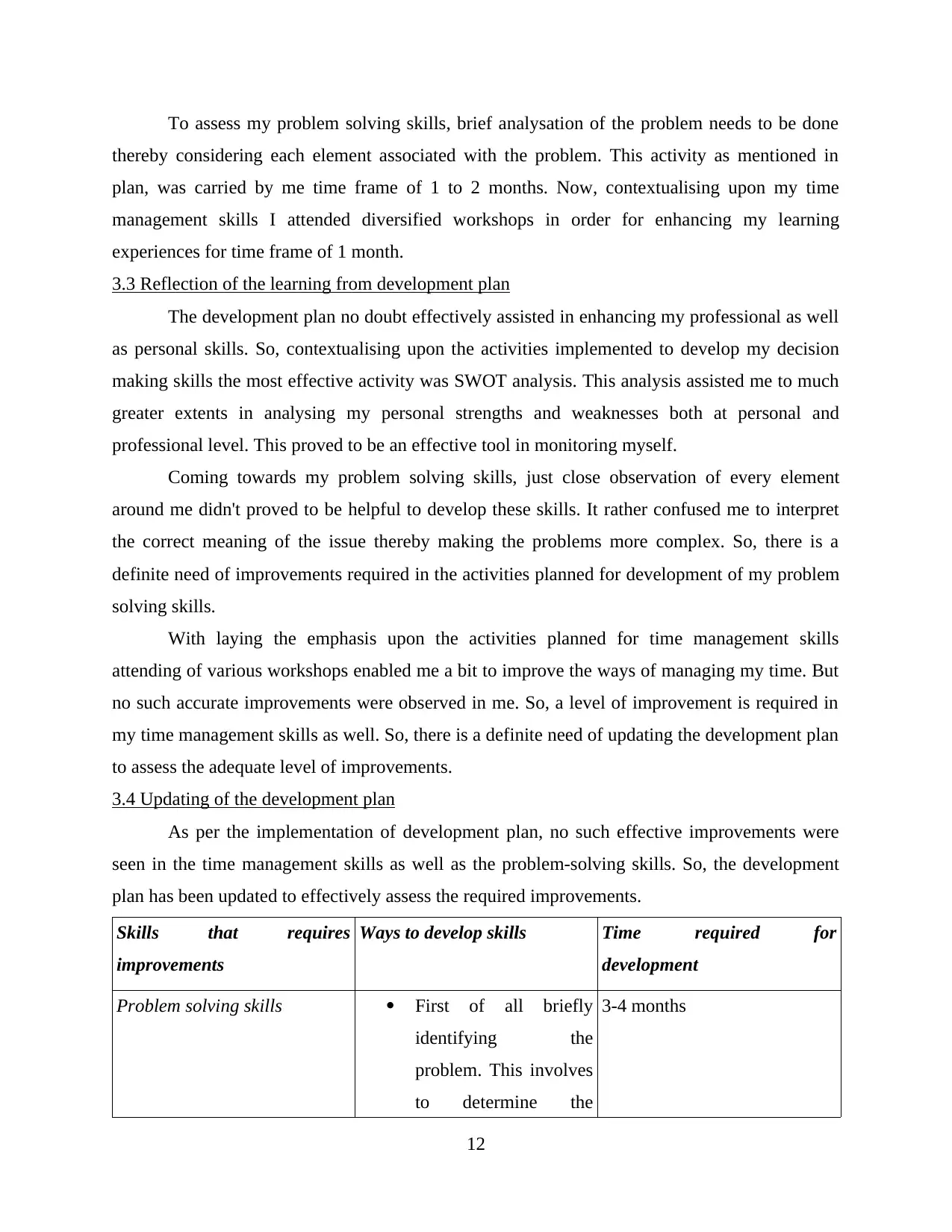
To assess my problem solving skills, brief analysation of the problem needs to be done
thereby considering each element associated with the problem. This activity as mentioned in
plan, was carried by me time frame of 1 to 2 months. Now, contextualising upon my time
management skills I attended diversified workshops in order for enhancing my learning
experiences for time frame of 1 month.
3.3 Reflection of the learning from development plan
The development plan no doubt effectively assisted in enhancing my professional as well
as personal skills. So, contextualising upon the activities implemented to develop my decision
making skills the most effective activity was SWOT analysis. This analysis assisted me to much
greater extents in analysing my personal strengths and weaknesses both at personal and
professional level. This proved to be an effective tool in monitoring myself.
Coming towards my problem solving skills, just close observation of every element
around me didn't proved to be helpful to develop these skills. It rather confused me to interpret
the correct meaning of the issue thereby making the problems more complex. So, there is a
definite need of improvements required in the activities planned for development of my problem
solving skills.
With laying the emphasis upon the activities planned for time management skills
attending of various workshops enabled me a bit to improve the ways of managing my time. But
no such accurate improvements were observed in me. So, a level of improvement is required in
my time management skills as well. So, there is a definite need of updating the development plan
to assess the adequate level of improvements.
3.4 Updating of the development plan
As per the implementation of development plan, no such effective improvements were
seen in the time management skills as well as the problem-solving skills. So, the development
plan has been updated to effectively assess the required improvements.
Skills that requires
improvements
Ways to develop skills Time required for
development
Problem solving skills First of all briefly
identifying the
problem. This involves
to determine the
3-4 months
12
thereby considering each element associated with the problem. This activity as mentioned in
plan, was carried by me time frame of 1 to 2 months. Now, contextualising upon my time
management skills I attended diversified workshops in order for enhancing my learning
experiences for time frame of 1 month.
3.3 Reflection of the learning from development plan
The development plan no doubt effectively assisted in enhancing my professional as well
as personal skills. So, contextualising upon the activities implemented to develop my decision
making skills the most effective activity was SWOT analysis. This analysis assisted me to much
greater extents in analysing my personal strengths and weaknesses both at personal and
professional level. This proved to be an effective tool in monitoring myself.
Coming towards my problem solving skills, just close observation of every element
around me didn't proved to be helpful to develop these skills. It rather confused me to interpret
the correct meaning of the issue thereby making the problems more complex. So, there is a
definite need of improvements required in the activities planned for development of my problem
solving skills.
With laying the emphasis upon the activities planned for time management skills
attending of various workshops enabled me a bit to improve the ways of managing my time. But
no such accurate improvements were observed in me. So, a level of improvement is required in
my time management skills as well. So, there is a definite need of updating the development plan
to assess the adequate level of improvements.
3.4 Updating of the development plan
As per the implementation of development plan, no such effective improvements were
seen in the time management skills as well as the problem-solving skills. So, the development
plan has been updated to effectively assess the required improvements.
Skills that requires
improvements
Ways to develop skills Time required for
development
Problem solving skills First of all briefly
identifying the
problem. This involves
to determine the
3-4 months
12
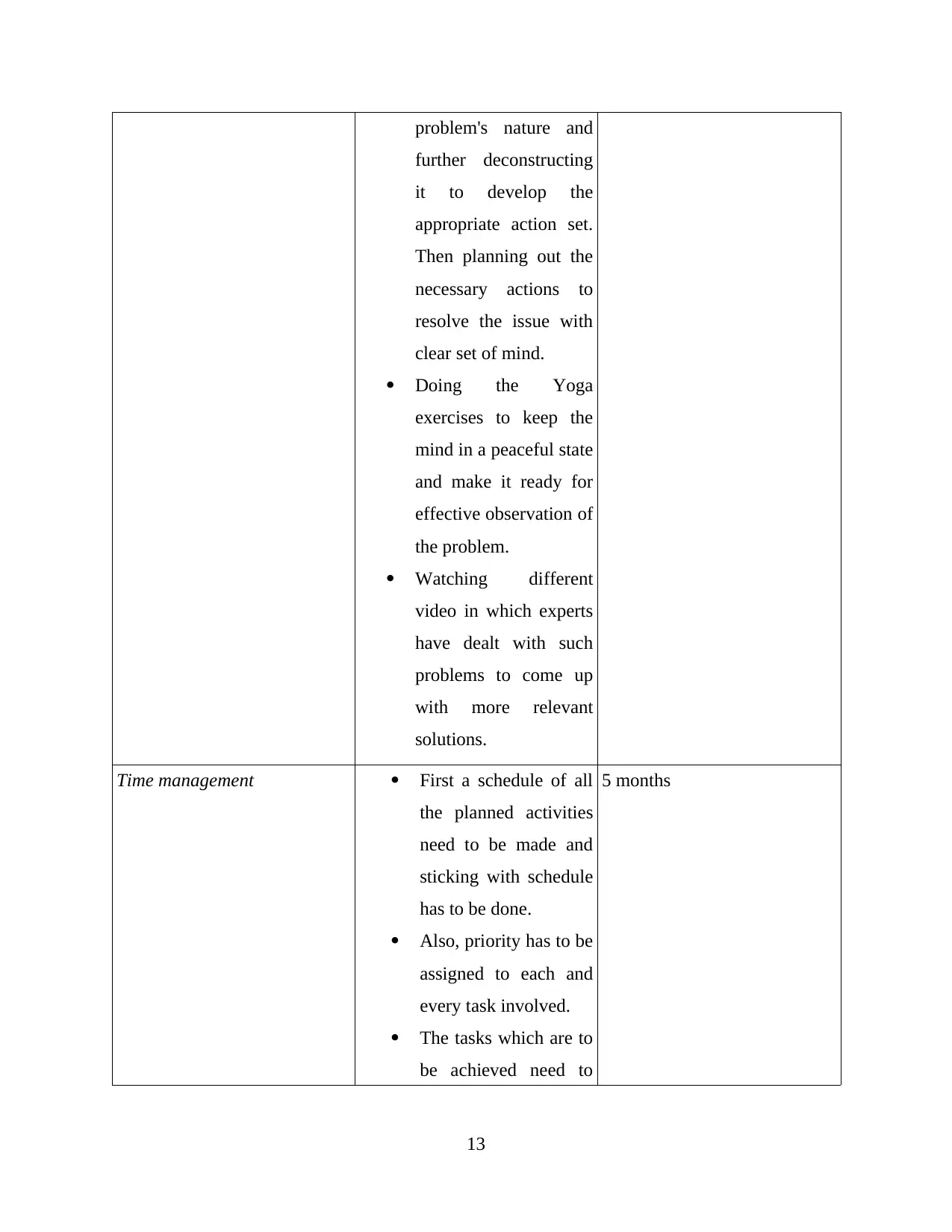
problem's nature and
further deconstructing
it to develop the
appropriate action set.
Then planning out the
necessary actions to
resolve the issue with
clear set of mind.
Doing the Yoga
exercises to keep the
mind in a peaceful state
and make it ready for
effective observation of
the problem.
Watching different
video in which experts
have dealt with such
problems to come up
with more relevant
solutions.
Time management First a schedule of all
the planned activities
need to be made and
sticking with schedule
has to be done.
Also, priority has to be
assigned to each and
every task involved.
The tasks which are to
be achieved need to
5 months
13
further deconstructing
it to develop the
appropriate action set.
Then planning out the
necessary actions to
resolve the issue with
clear set of mind.
Doing the Yoga
exercises to keep the
mind in a peaceful state
and make it ready for
effective observation of
the problem.
Watching different
video in which experts
have dealt with such
problems to come up
with more relevant
solutions.
Time management First a schedule of all
the planned activities
need to be made and
sticking with schedule
has to be done.
Also, priority has to be
assigned to each and
every task involved.
The tasks which are to
be achieved need to
5 months
13
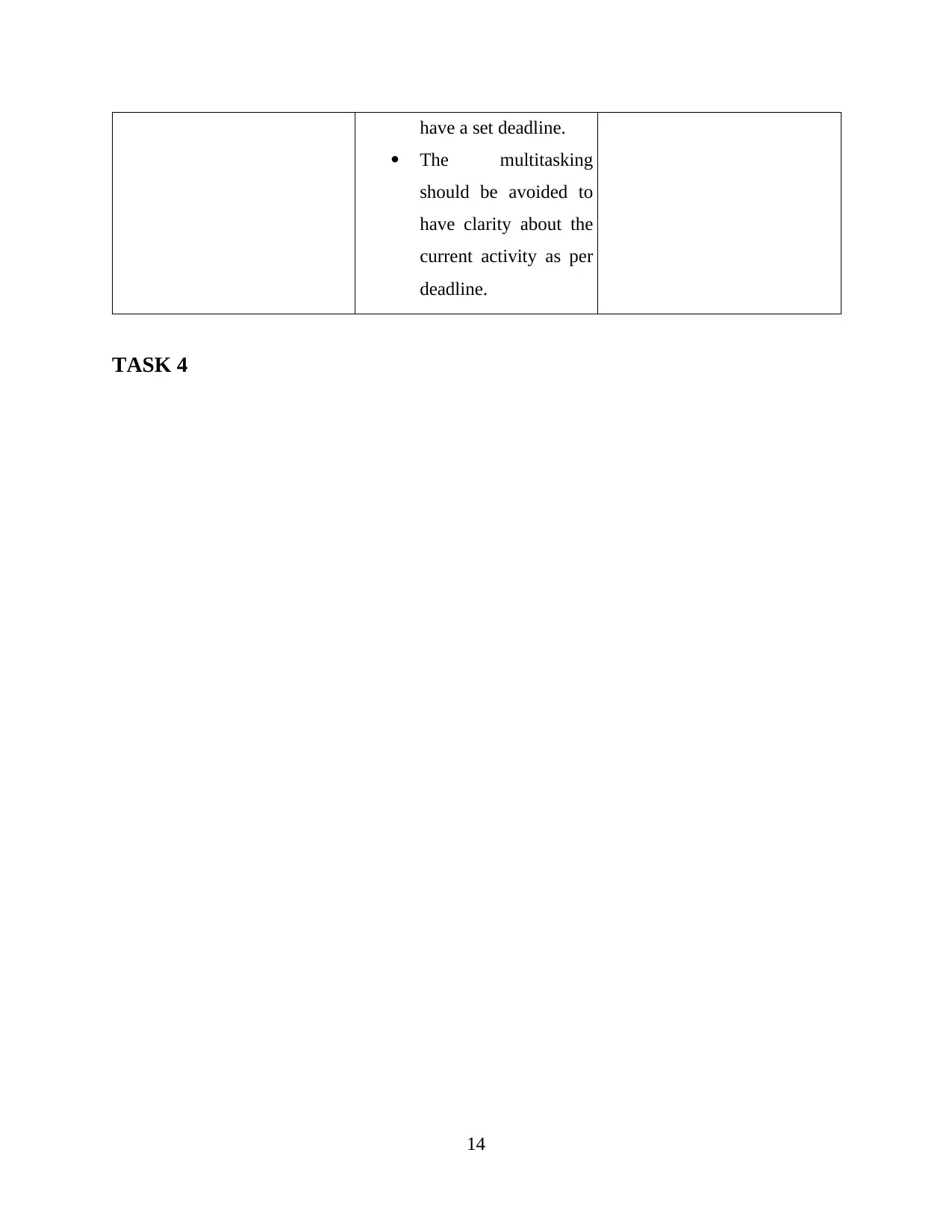
have a set deadline.
The multitasking
should be avoided to
have clarity about the
current activity as per
deadline.
TASK 4
14
The multitasking
should be avoided to
have clarity about the
current activity as per
deadline.
TASK 4
14
Secure Best Marks with AI Grader
Need help grading? Try our AI Grader for instant feedback on your assignments.
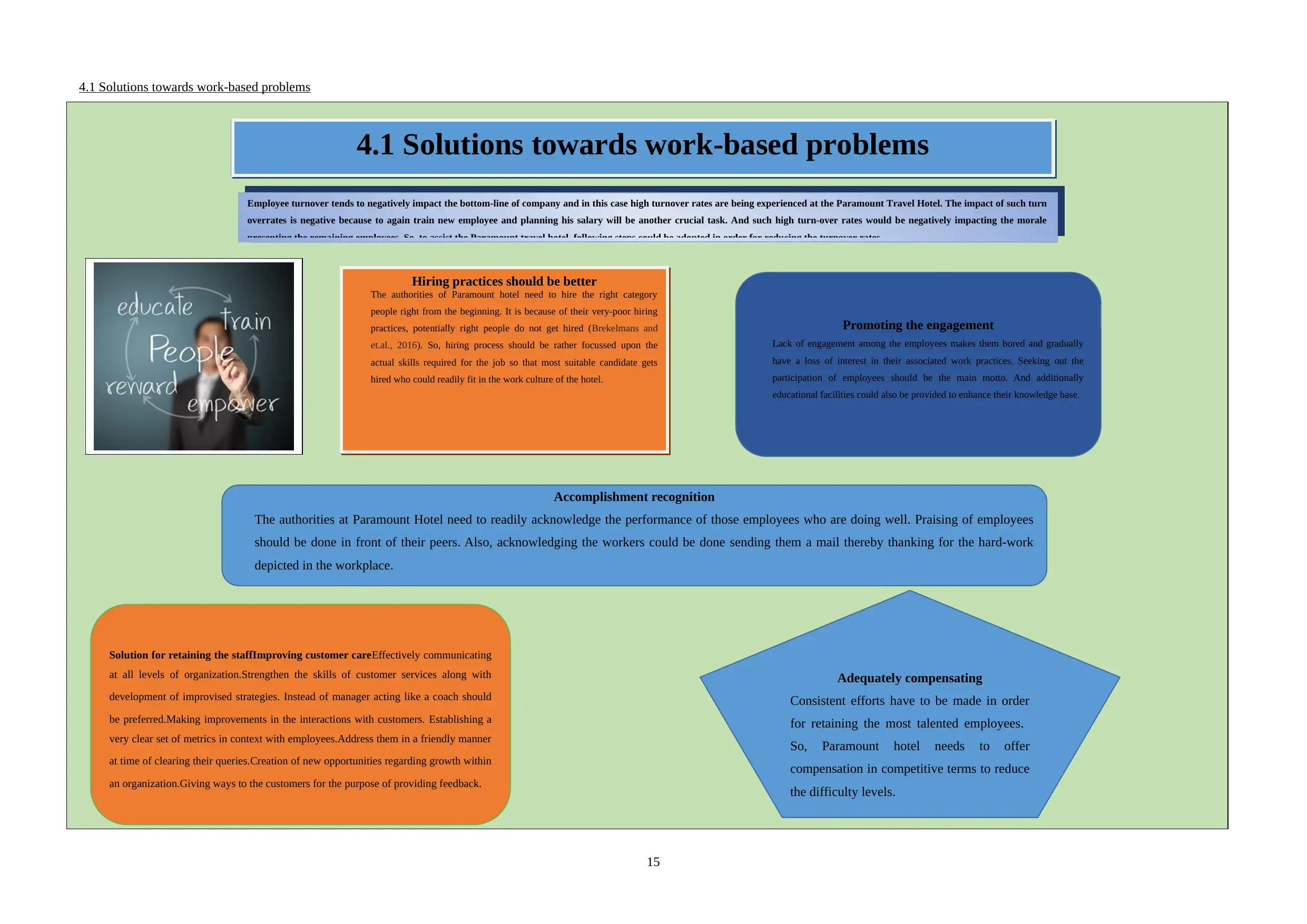
4.1 Solutions towards work-based problems
15
4.1 Solutions towards work-based problems
Employee turnover tends to negatively impact the bottom-line of company and in this case high turnover rates are being experienced at the Paramount Travel Hotel. The impact of such turn
overrates is negative because to again train new employee and planning his salary will be another crucial task. And such high turn-over rates would be negatively impacting the morale
presenting the remaining employees. So, to assist the Paramount travel hotel, following steps could be adopted in order for reducing the turnover rates.
Hiring practices should be better
The authorities of Paramount hotel need to hire the right category
people right from the beginning. It is because of their very-poor hiring
practices, potentially right people do not get hired (Brekelmans and
et.al., 2016). So, hiring process should be rather focussed upon the
actual skills required for the job so that most suitable candidate gets
hired who could readily fit in the work culture of the hotel.
Promoting the engagement
Lack of engagement among the employees makes them bored and gradually
have a loss of interest in their associated work practices. Seeking out the
participation of employees should be the main motto. And additionally
educational facilities could also be provided to enhance their knowledge base.
Accomplishment recognition
The authorities at Paramount Hotel need to readily acknowledge the performance of those employees who are doing well. Praising of employees
should be done in front of their peers. Also, acknowledging the workers could be done sending them a mail thereby thanking for the hard-work
depicted in the workplace.
Solution for retaining the staffImproving customer careEffectively communicating
at all levels of organization.Strengthen the skills of customer services along with
development of improvised strategies. Instead of manager acting like a coach should
be preferred.Making improvements in the interactions with customers. Establishing a
very clear set of metrics in context with employees.Address them in a friendly manner
at time of clearing their queries.Creation of new opportunities regarding growth within
an organization.Giving ways to the customers for the purpose of providing feedback.
Adequately compensating
Consistent efforts have to be made in order
for retaining the most talented employees.
So, Paramount hotel needs to offer
compensation in competitive terms to reduce
the difficulty levels.
15
4.1 Solutions towards work-based problems
Employee turnover tends to negatively impact the bottom-line of company and in this case high turnover rates are being experienced at the Paramount Travel Hotel. The impact of such turn
overrates is negative because to again train new employee and planning his salary will be another crucial task. And such high turn-over rates would be negatively impacting the morale
presenting the remaining employees. So, to assist the Paramount travel hotel, following steps could be adopted in order for reducing the turnover rates.
Hiring practices should be better
The authorities of Paramount hotel need to hire the right category
people right from the beginning. It is because of their very-poor hiring
practices, potentially right people do not get hired (Brekelmans and
et.al., 2016). So, hiring process should be rather focussed upon the
actual skills required for the job so that most suitable candidate gets
hired who could readily fit in the work culture of the hotel.
Promoting the engagement
Lack of engagement among the employees makes them bored and gradually
have a loss of interest in their associated work practices. Seeking out the
participation of employees should be the main motto. And additionally
educational facilities could also be provided to enhance their knowledge base.
Accomplishment recognition
The authorities at Paramount Hotel need to readily acknowledge the performance of those employees who are doing well. Praising of employees
should be done in front of their peers. Also, acknowledging the workers could be done sending them a mail thereby thanking for the hard-work
depicted in the workplace.
Solution for retaining the staffImproving customer careEffectively communicating
at all levels of organization.Strengthen the skills of customer services along with
development of improvised strategies. Instead of manager acting like a coach should
be preferred.Making improvements in the interactions with customers. Establishing a
very clear set of metrics in context with employees.Address them in a friendly manner
at time of clearing their queries.Creation of new opportunities regarding growth within
an organization.Giving ways to the customers for the purpose of providing feedback.
Adequately compensating
Consistent efforts have to be made in order
for retaining the most talented employees.
So, Paramount hotel needs to offer
compensation in competitive terms to reduce
the difficulty levels.
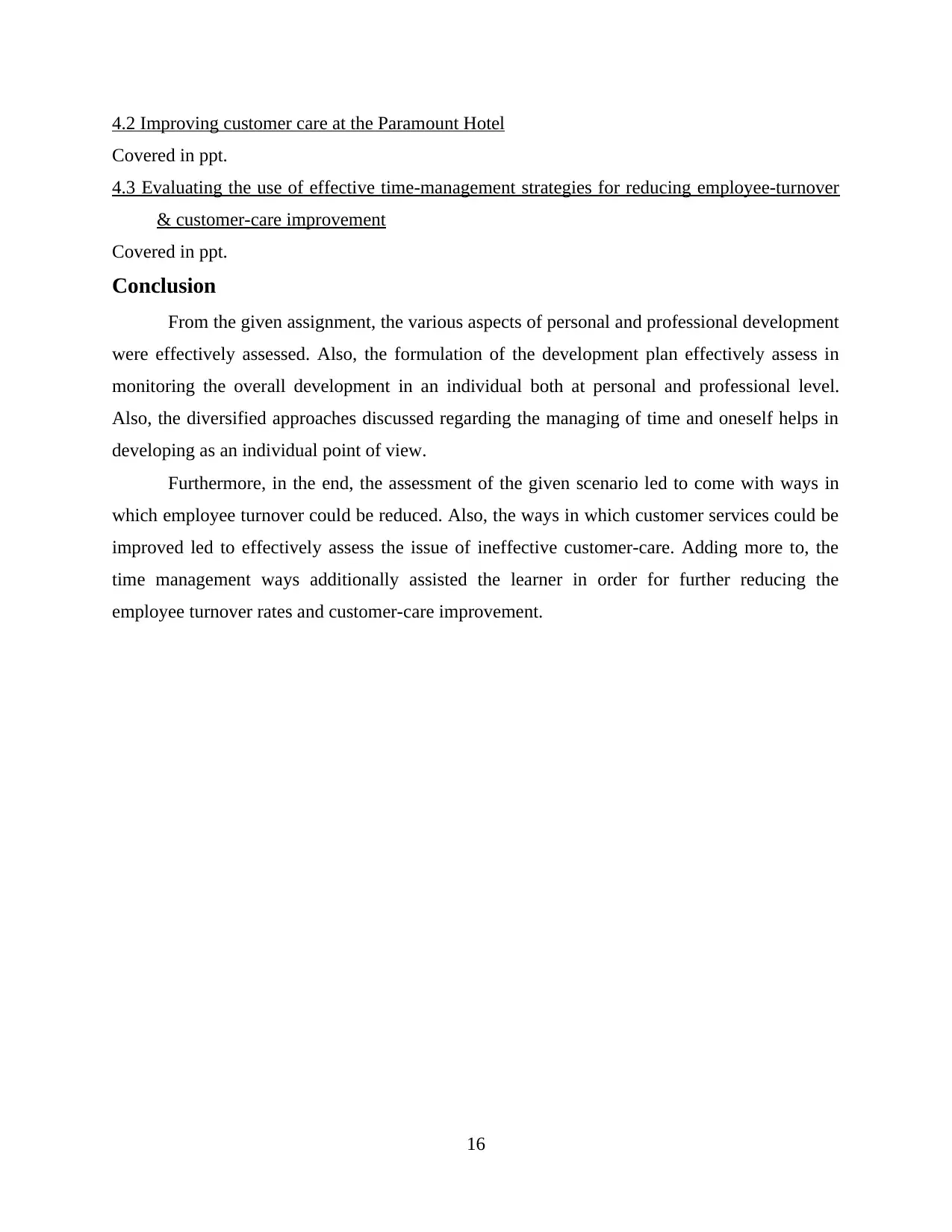
4.2 Improving customer care at the Paramount Hotel
Covered in ppt.
4.3 Evaluating the use of effective time-management strategies for reducing employee-turnover
& customer-care improvement
Covered in ppt.
Conclusion
From the given assignment, the various aspects of personal and professional development
were effectively assessed. Also, the formulation of the development plan effectively assess in
monitoring the overall development in an individual both at personal and professional level.
Also, the diversified approaches discussed regarding the managing of time and oneself helps in
developing as an individual point of view.
Furthermore, in the end, the assessment of the given scenario led to come with ways in
which employee turnover could be reduced. Also, the ways in which customer services could be
improved led to effectively assess the issue of ineffective customer-care. Adding more to, the
time management ways additionally assisted the learner in order for further reducing the
employee turnover rates and customer-care improvement.
16
Covered in ppt.
4.3 Evaluating the use of effective time-management strategies for reducing employee-turnover
& customer-care improvement
Covered in ppt.
Conclusion
From the given assignment, the various aspects of personal and professional development
were effectively assessed. Also, the formulation of the development plan effectively assess in
monitoring the overall development in an individual both at personal and professional level.
Also, the diversified approaches discussed regarding the managing of time and oneself helps in
developing as an individual point of view.
Furthermore, in the end, the assessment of the given scenario led to come with ways in
which employee turnover could be reduced. Also, the ways in which customer services could be
improved led to effectively assess the issue of ineffective customer-care. Adding more to, the
time management ways additionally assisted the learner in order for further reducing the
employee turnover rates and customer-care improvement.
16
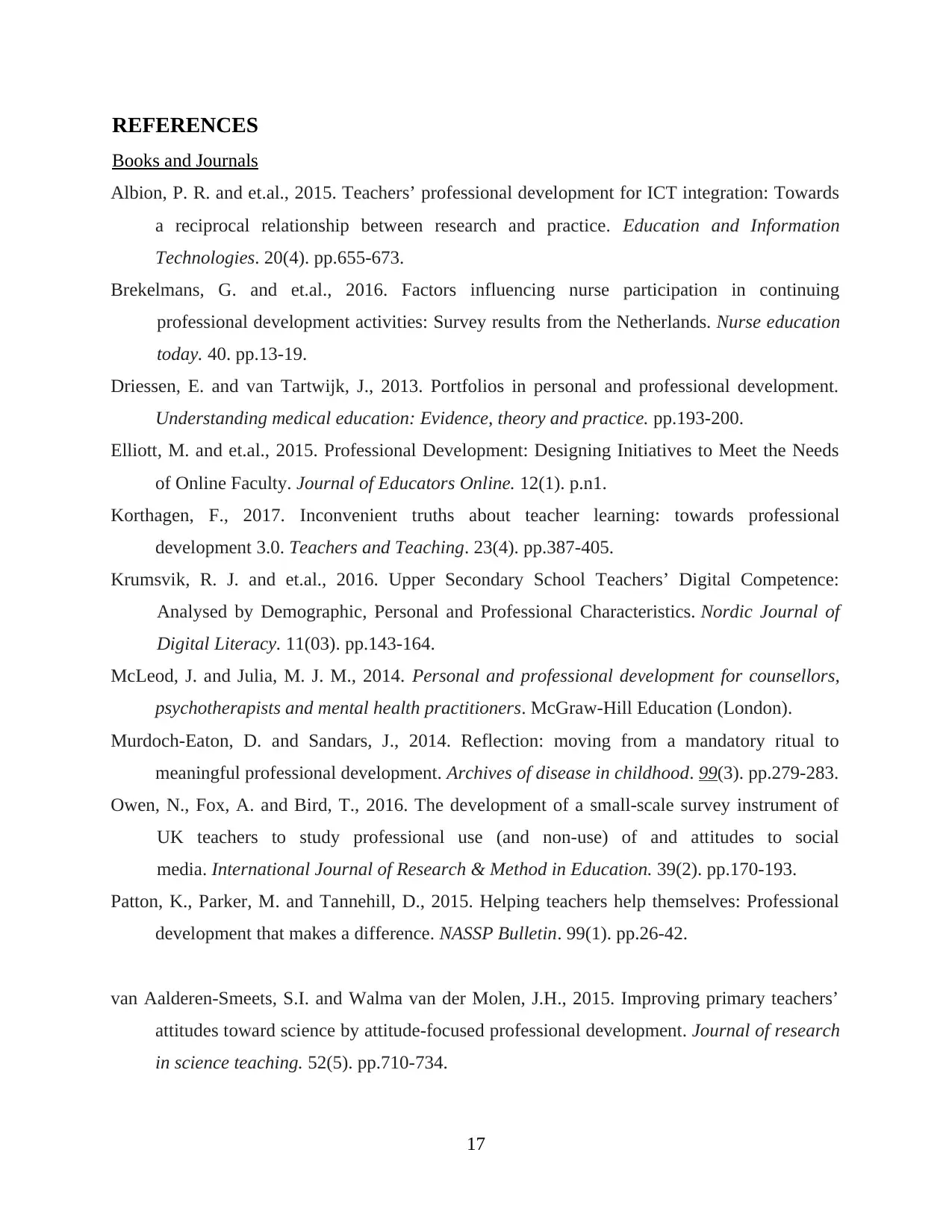
REFERENCES
Books and Journals
Albion, P. R. and et.al., 2015. Teachers’ professional development for ICT integration: Towards
a reciprocal relationship between research and practice. Education and Information
Technologies. 20(4). pp.655-673.
Brekelmans, G. and et.al., 2016. Factors influencing nurse participation in continuing
professional development activities: Survey results from the Netherlands. Nurse education
today. 40. pp.13-19.
Driessen, E. and van Tartwijk, J., 2013. Portfolios in personal and professional development.
Understanding medical education: Evidence, theory and practice. pp.193-200.
Elliott, M. and et.al., 2015. Professional Development: Designing Initiatives to Meet the Needs
of Online Faculty. Journal of Educators Online. 12(1). p.n1.
Korthagen, F., 2017. Inconvenient truths about teacher learning: towards professional
development 3.0. Teachers and Teaching. 23(4). pp.387-405.
Krumsvik, R. J. and et.al., 2016. Upper Secondary School Teachers’ Digital Competence:
Analysed by Demographic, Personal and Professional Characteristics. Nordic Journal of
Digital Literacy. 11(03). pp.143-164.
McLeod, J. and Julia, M. J. M., 2014. Personal and professional development for counsellors,
psychotherapists and mental health practitioners. McGraw-Hill Education (London).
Murdoch-Eaton, D. and Sandars, J., 2014. Reflection: moving from a mandatory ritual to
meaningful professional development. Archives of disease in childhood. 99(3). pp.279-283.
Owen, N., Fox, A. and Bird, T., 2016. The development of a small-scale survey instrument of
UK teachers to study professional use (and non-use) of and attitudes to social
media. International Journal of Research & Method in Education. 39(2). pp.170-193.
Patton, K., Parker, M. and Tannehill, D., 2015. Helping teachers help themselves: Professional
development that makes a difference. NASSP Bulletin. 99(1). pp.26-42.
van Aalderen‐Smeets, S.I. and Walma van der Molen, J.H., 2015. Improving primary teachers’
attitudes toward science by attitude‐focused professional development. Journal of research
in science teaching. 52(5). pp.710-734.
17
Books and Journals
Albion, P. R. and et.al., 2015. Teachers’ professional development for ICT integration: Towards
a reciprocal relationship between research and practice. Education and Information
Technologies. 20(4). pp.655-673.
Brekelmans, G. and et.al., 2016. Factors influencing nurse participation in continuing
professional development activities: Survey results from the Netherlands. Nurse education
today. 40. pp.13-19.
Driessen, E. and van Tartwijk, J., 2013. Portfolios in personal and professional development.
Understanding medical education: Evidence, theory and practice. pp.193-200.
Elliott, M. and et.al., 2015. Professional Development: Designing Initiatives to Meet the Needs
of Online Faculty. Journal of Educators Online. 12(1). p.n1.
Korthagen, F., 2017. Inconvenient truths about teacher learning: towards professional
development 3.0. Teachers and Teaching. 23(4). pp.387-405.
Krumsvik, R. J. and et.al., 2016. Upper Secondary School Teachers’ Digital Competence:
Analysed by Demographic, Personal and Professional Characteristics. Nordic Journal of
Digital Literacy. 11(03). pp.143-164.
McLeod, J. and Julia, M. J. M., 2014. Personal and professional development for counsellors,
psychotherapists and mental health practitioners. McGraw-Hill Education (London).
Murdoch-Eaton, D. and Sandars, J., 2014. Reflection: moving from a mandatory ritual to
meaningful professional development. Archives of disease in childhood. 99(3). pp.279-283.
Owen, N., Fox, A. and Bird, T., 2016. The development of a small-scale survey instrument of
UK teachers to study professional use (and non-use) of and attitudes to social
media. International Journal of Research & Method in Education. 39(2). pp.170-193.
Patton, K., Parker, M. and Tannehill, D., 2015. Helping teachers help themselves: Professional
development that makes a difference. NASSP Bulletin. 99(1). pp.26-42.
van Aalderen‐Smeets, S.I. and Walma van der Molen, J.H., 2015. Improving primary teachers’
attitudes toward science by attitude‐focused professional development. Journal of research
in science teaching. 52(5). pp.710-734.
17
Paraphrase This Document
Need a fresh take? Get an instant paraphrase of this document with our AI Paraphraser
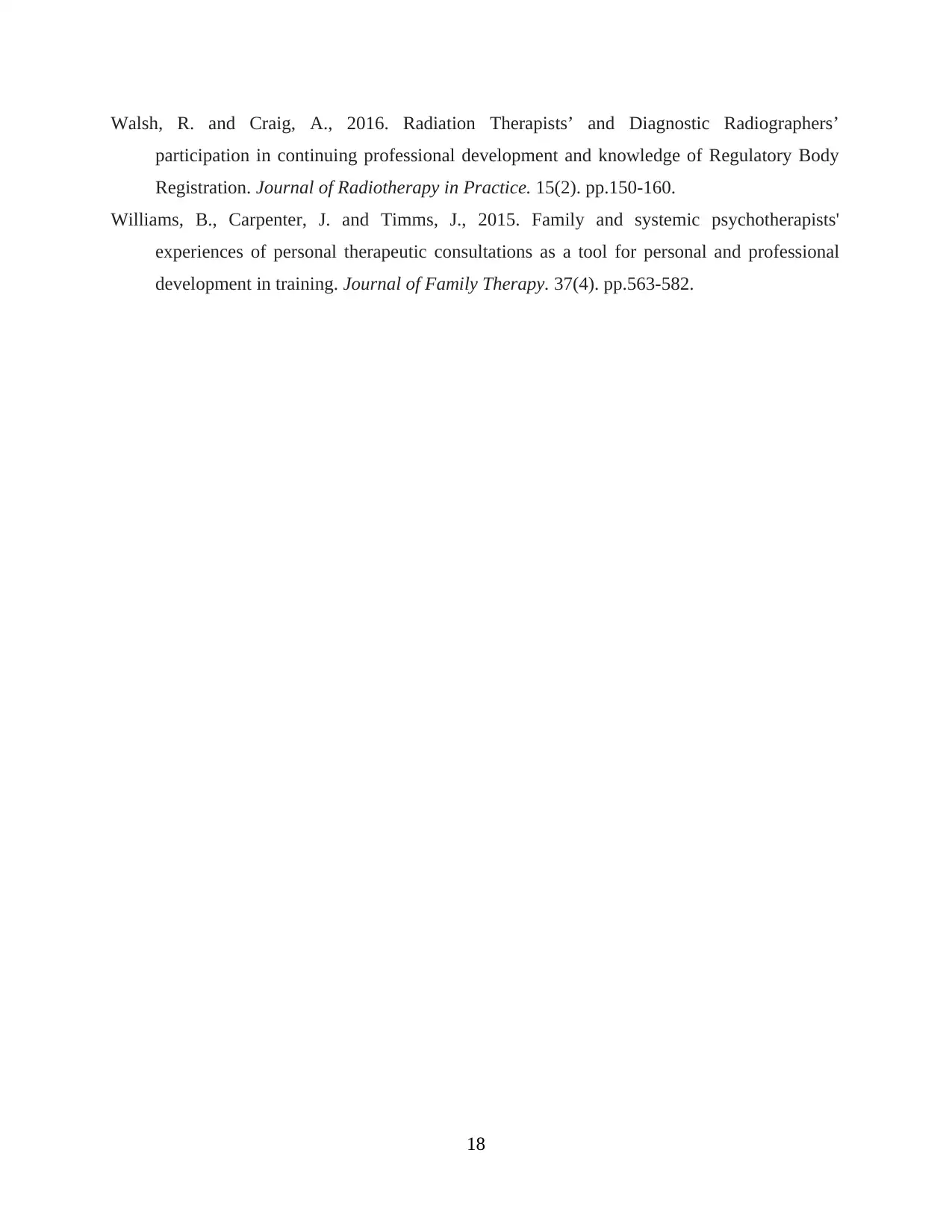
Walsh, R. and Craig, A., 2016. Radiation Therapists’ and Diagnostic Radiographers’
participation in continuing professional development and knowledge of Regulatory Body
Registration. Journal of Radiotherapy in Practice. 15(2). pp.150-160.
Williams, B., Carpenter, J. and Timms, J., 2015. Family and systemic psychotherapists'
experiences of personal therapeutic consultations as a tool for personal and professional
development in training. Journal of Family Therapy. 37(4). pp.563-582.
18
participation in continuing professional development and knowledge of Regulatory Body
Registration. Journal of Radiotherapy in Practice. 15(2). pp.150-160.
Williams, B., Carpenter, J. and Timms, J., 2015. Family and systemic psychotherapists'
experiences of personal therapeutic consultations as a tool for personal and professional
development in training. Journal of Family Therapy. 37(4). pp.563-582.
18
1 out of 20
Related Documents
Your All-in-One AI-Powered Toolkit for Academic Success.
+13062052269
info@desklib.com
Available 24*7 on WhatsApp / Email
![[object Object]](/_next/static/media/star-bottom.7253800d.svg)
Unlock your academic potential
© 2024 | Zucol Services PVT LTD | All rights reserved.





